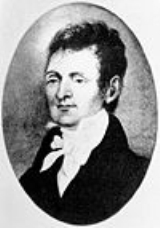
List of United States Senators from Tennessee
Encyclopedia
Tennessee
was admitted to the United States on June 1, 1796. Its Senate
seats were declared vacant in March 1862 owing to its secession
from the Union
. They were again filled from July 1866. The current Senators are Republicans Lamar Alexander
and Bob Corker
.
U.S. Senators
belong to the electoral cycle that were elected for one session of the U.S. Congress in the first election of 1788 and whose seats in recent years are contested in 1994, 2000, 2006, and 2012
.
belong to the electoral cycle that were elected for two sessions of the U.S. Congress in the first election of 1788 and whose seats in recent years are contested in 1996, 2002, 2008, and 2014.
Tennessee
Tennessee is a U.S. state located in the Southeastern United States. It has a population of 6,346,105, making it the nation's 17th-largest state by population, and covers , making it the 36th-largest by total land area...
was admitted to the United States on June 1, 1796. Its Senate
United States Senate
The United States Senate is the upper house of the bicameral legislature of the United States, and together with the United States House of Representatives comprises the United States Congress. The composition and powers of the Senate are established in Article One of the U.S. Constitution. Each...
seats were declared vacant in March 1862 owing to its secession
Secession
Secession is the act of withdrawing from an organization, union, or especially a political entity. Threats of secession also can be a strategy for achieving more limited goals.-Secession theory:...
from the Union
Union (American Civil War)
During the American Civil War, the Union was a name used to refer to the federal government of the United States, which was supported by the twenty free states and five border slave states. It was opposed by 11 southern slave states that had declared a secession to join together to form the...
. They were again filled from July 1866. The current Senators are Republicans Lamar Alexander
Lamar Alexander
Andrew Lamar Alexander is the senior United States Senator from Tennessee and Conference Chair of the Republican Party. He was previously the 45th Governor of Tennessee from 1979 to 1987, United States Secretary of Education from 1991 to 1993 under President George H. W...
and Bob Corker
Bob Corker
Robert Phillips "Bob" Corker, Jr. is the junior United States Senator from Tennessee. Before his election to the Senate in 2006, he served as mayor of Chattanooga, Tennessee from 2001 to 2005. Corker was a businessman prior to holding public office.-Early life and family:Born in Orangeburg, South...
.
Class 1
Class 1Classes of United States Senators
The three classes of United States Senators are currently made up of 33 or 34 Senate seats. The purpose of the classes is to determine which Senate seats will be up for election in a given year. The three groups are staggered so that one of them is up for election every two years.A senator's...
U.S. Senators
United States Senate
The United States Senate is the upper house of the bicameral legislature of the United States, and together with the United States House of Representatives comprises the United States Congress. The composition and powers of the Senate are established in Article One of the U.S. Constitution. Each...
belong to the electoral cycle that were elected for one session of the U.S. Congress in the first election of 1788 and whose seats in recent years are contested in 1994, 2000, 2006, and 2012
United States Senate elections, 2012
Elections to the United States Senate are to be held on November 6, 2012, with 33 of the 100 seats in the Senate being contested in regular elections whose winners will serve six-year terms from January 3, 2013 until January 3, 2019. Additionally, special elections may be held to fill vacancies...
.
| # | Senator | Party | Years | Congress | Term | Electoral history |
|---|---|---|---|---|---|---|
| 1 |  William Cocke William CockeWilliam Cocke William Cocke was an American lawyer, pioneer, and statesman. He has the distinction of having served in the state legislature of four different states: Virginia, North Carolina, Tennessee, and Mississippi, and was one of the first two United States senators for Tennessee.-Biography:William was... |
Democratic-Republican Democratic-Republican Party (United States) The Democratic-Republican Party or Republican Party was an American political party founded in the early 1790s by Thomas Jefferson and James Madison. Political scientists use the former name, while historians prefer the latter one; contemporaries generally called the party the "Republicans", along... |
August 2, 1796 – September 26, 1797 |
4 4th United States Congress -House of Representatives:- Senate :* President: John Adams * President pro tempore:** Henry Tazewell , first elected December 7, 1795** Samuel Livermore , first elected May 6, 1796** William Bingham , first elected February 16, 1797... |
1 | Elected in 1796 United States Senate elections, 1796 The United States Senate election of 1796 was an election for the United States Senate which, coinciding with John Adams's election as President, had the ruling Federalist Party gain one seat.... |
| 5 5th United States Congress The Fifth United States Congress was a meeting of the legislative branch of the United States federal government, consisting of the United States Senate and the United States House of Representatives... |
2 | Appointed to begin the term due to failure of legislature to elect Resigned when successor elected |
||||
| 2 | 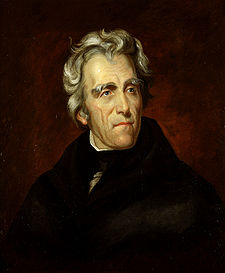 Andrew Jackson Andrew JacksonAndrew Jackson Andrew Jackson was the seventh President of the United States . Based in frontier Tennessee, Jackson was a politician and army general who defeated the Creek Indians at the Battle of Horseshoe Bend , and the British at the Battle of New Orleans... |
Democratic-Republican Democratic-Republican Party (United States) The Democratic-Republican Party or Republican Party was an American political party founded in the early 1790s by Thomas Jefferson and James Madison. Political scientists use the former name, while historians prefer the latter one; contemporaries generally called the party the "Republicans", along... |
September 26, 1797 – April 1798 |
Elected to finish Cocke's term Resigned |
||
| Vacant | April 1798 – October 6, 1798 |
|||||
| 3 |  Daniel Smith Daniel SmithDaniel Smith (surveyor) Daniel Smith was a surveyor, an American Revolutionary War patriot, and twice a United States Senator from Tennessee.-Biography:... |
Democratic-Republican Democratic-Republican Party (United States) The Democratic-Republican Party or Republican Party was an American political party founded in the early 1790s by Thomas Jefferson and James Madison. Political scientists use the former name, while historians prefer the latter one; contemporaries generally called the party the "Republicans", along... |
October 6, 1798 – March 3, 1799 |
Appointed to finish Jackson's term |
||
| 4 | 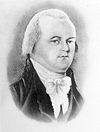 Joseph Anderson Joseph AndersonJoseph Anderson Joseph Inslee Anderson was an American soldier, judge, and politician, who served as a United States Senator from Tennessee from 1799 to 1815, and later as the first Comptroller of the United States Treasury... |
Democratic-Republican Democratic-Republican Party (United States) The Democratic-Republican Party or Republican Party was an American political party founded in the early 1790s by Thomas Jefferson and James Madison. Political scientists use the former name, while historians prefer the latter one; contemporaries generally called the party the "Republicans", along... |
March 4, 1799 – March 3, 1815 |
6 6th United States Congress The Sixth United States Congress was a meeting of the legislative branch of the United States federal government, consisting of the United States Senate and the United States House of Representatives. It met at Congress Hall in Philadelphia, Pennsylvania and in Washington, D.C. from March 4, 1799... |
Elected to finish Jackson's term | |
| 7 7th United States Congress - House of Representatives :-Senate:* President: Aaron Burr * President pro tempore:** Abraham Baldwin , first elected December 7, 1801** Stephen R. Bradley , first elected December 14, 1802-House of Representatives:... |
||||||
| 8 8th United States Congress - Senate :* President: Aaron Burr * President pro tempore: John Brown , October 17, 1803 – February 26, 1804** Jesse Franklin , March 10, 1804 – November 4, 1804** Joseph Anderson , January 15, 1805 – December 1, 1805- House of Representatives :... |
3 | Re-elected in 1803 | ||||
| 9 9th United States Congress - Senate :* President: George Clinton * President pro tempore: Samuel Smith - House of Representatives :* Speaker: Nathaniel Macon -Members:This list is arranged by chamber, then by state... |
||||||
| 10 10th United States Congress - House of Representatives :- Senate :*President: George Clinton *President pro tempore: Samuel Smith , elected April 16, 1808** Stephen R. Bradley , elected December 28, 1808** John Milledge , elected January 30, 1809... |
||||||
| 11 11th United States Congress - House of Representatives :-Leadership:- Senate :* President: George Clinton * President pro tempore:** John Milledge ** Andrew Gregg , elected June 26, 1809** John Gaillard , elected February 28, 1810... |
4 | Re-elected in 1809 Retired |
||||
| 12 12th United States Congress - House of Representatives :During this congress, one new House seat was added for the new state of Louisiana.- Senate :*President: George Clinton *President pro tempore: William H. Crawford -House of Representatives:*Speaker: Henry Clay... |
||||||
| 13 13th United States Congress - Senate :* President: Elbridge Gerry , until November 23, 1814, thereafter vacant.* President pro tempore: Joseph B. Varnum , December 6, 1813 – February 3, 1814** John Gaillard , elected November 25, 1814- House of Representatives :... |
||||||
| Vacant | March 4, 1815 – October 10, 1815 |
14 14th United States Congress - Senate :* President: Vacant* President pro tempore: John Gaillard of South Carolina, first elected December 4, 1815- House of Representatives :* Speaker: Henry Clay of Kentucky-Members:This list is arranged by chamber, then by state... |
5 | |||
| 5 |  George W. Campbell George W. CampbellGeorge W. Campbell George Washington Campbell was an American statesman who served as a U.S. Representative, Senator, Tennessee Supreme Court Justice, U.S... |
Democratic-Republican Democratic-Republican Party (United States) The Democratic-Republican Party or Republican Party was an American political party founded in the early 1790s by Thomas Jefferson and James Madison. Political scientists use the former name, while historians prefer the latter one; contemporaries generally called the party the "Republicans", along... |
October 10, 1815 – April 20, 1818 |
14 14th United States Congress - Senate :* President: Vacant* President pro tempore: John Gaillard of South Carolina, first elected December 4, 1815- House of Representatives :* Speaker: Henry Clay of Kentucky-Members:This list is arranged by chamber, then by state... (Continued) |
Elected to finish vacant term Resigned |
|
| 15 15th United States Congress -Leadership:- Senate :* President: Daniel D. Tompkins * President pro tempore:** John Gaillard , elected March 4, 1817** James Barbour , elected February 15, 1819- House of Representatives :*Speaker: Henry Clay -Members:... |
||||||
| Vacant | April 20, 1818 – September 27, 1818 |
|||||
| 6 |  John H. Eaton John H. Eaton |
Democratic-Republican Democratic-Republican Party (United States) The Democratic-Republican Party or Republican Party was an American political party founded in the early 1790s by Thomas Jefferson and James Madison. Political scientists use the former name, while historians prefer the latter one; contemporaries generally called the party the "Republicans", along... |
September 27, 1818 – March 9, 1829 |
15 15th United States Congress -Leadership:- Senate :* President: Daniel D. Tompkins * President pro tempore:** John Gaillard , elected March 4, 1817** James Barbour , elected February 15, 1819- House of Representatives :*Speaker: Henry Clay -Members:... (Continued) |
Appointed to continue Cambell's term Elected to finish Cambell's term |
|
| 16 16th United States Congress -House of Representatives:During this congress, one House seat was added for the new state of Alabama and one seat was reapportioned from Massachusetts to the new state of Maine. For the beginning of the next congress, six more seats from Massachusetts would be reapportioned to... |
||||||
| 17 17th United States Congress The Seventeenth United States Congress was a meeting of the legislative branch of the United States federal government, consisting of the United States Senate and the United States House of Representatives. It met in Washington, D.C. from March 4, 1821 to March 3, 1823, during the fifth and sixth... |
6 | Re-elected in 1821 | ||||
| 18 18th United States Congress The Eighteenth United States Congress was a meeting of the legislative branch of the United States federal government, consisting of the United States Senate and the United States House of Representatives. It met in Washington, D.C. from March 4, 1823 to March 3, 1825, during the seventh and eighth... |
||||||
| 19 19th United States Congress -House of Representatives:-Leadership:- Senate :* President: John C. Calhoun * President pro tempore: John Gaillard , until December 4, 1825** Nathaniel Macon , from May 20, 1826- House of Representatives :* Speaker: John W. Taylor -Members:... |
||||||
| 20 20th United States Congress -House of Representatives:-Leadership:- Senate :* President: John C. Calhoun * President pro tempore: Samuel Smith - House of Representatives :* Speaker: Andrew Stevenson -Members:This list is arranged by chamber, then by state... |
7 | Re-elected in 1827 Resigned to become U.S. Secretary of War |
||||
| 21 21st United States Congress -House of Representatives:-Leadership:- Senate :* President: John C. Calhoun * President pro tempore: Samuel Smith - House of Representatives :* Speaker: Andrew Stevenson -Members:This list is arranged by chamber, then by state... |
||||||
| Vacant | March 9, 1829 – October 19, 1829 |
|||||
| 7 |  Felix Grundy Felix GrundyFelix Grundy Felix Grundy was a U.S. Congressman and U.S. Senator from Tennessee who also served as the 13th Attorney General of the United States.-Biography:... |
Jacksonian | October 19, 1829 – July 4, 1838 |
21 21st United States Congress -House of Representatives:-Leadership:- Senate :* President: John C. Calhoun * President pro tempore: Samuel Smith - House of Representatives :* Speaker: Andrew Stevenson -Members:This list is arranged by chamber, then by state... (Continued) |
Elected to finish Eaton's term | |
| 22 22nd United States Congress -House of Representatives:-Leadership:- Senate :* President:** John C. Calhoun , resigned December 28, 1832, thereafter vacant.* President pro tempore:** Samuel Smith , first elected December 5, 1831** Littleton W... |
||||||
| Democratic Democratic Party (United States) The Democratic Party is one of two major contemporary political parties in the United States, along with the Republican Party. The party's socially liberal and progressive platform is largely considered center-left in the U.S. political spectrum. The party has the lengthiest record of continuous... |
23 23rd United States Congress -House of Representatives:For the beginning of this congress, the size of the House was increased from 213 seats to 240 seats, following the 1830 United States Census .- Leadership :- Senate :* President: Martin Van Buren... |
8 | Re-elected in 1833 Resigned to become U.S. Attorney General |
|||
| 24 24th United States Congress -House of Representatives:During this congress one House seat was added for each of the new states of Arkansas and Michigan.-Leadership:- Senate :* President: Martin Van Buren * President pro tempore: William R. King - House of Representatives :... |
||||||
| 25 25th United States Congress -House of Representatives:-Leadership:- Senate :* President: Richard Mentor Johnson * President pro tempore: William R. King - House of Representatives :* Speaker: James K. Polk -Members:This list is arranged by chamber, then by state... |
||||||
| Vacant | July 5, 1838 – September 16, 1838 |
|||||
| 8 | 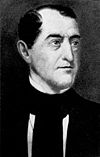 Ephraim H. Foster Ephraim H. FosterEphraim H. Foster Ephraim Hubbard Foster twice served as a United States Senator from Tennessee. During his political career, he was a member of the Whig Party.-Biography:... |
Whig Whig Party (United States) The Whig Party was a political party of the United States during the era of Jacksonian democracy. Considered integral to the Second Party System and operating from the early 1830s to the mid-1850s, the party was formed in opposition to the policies of President Andrew Jackson and his Democratic... |
September 17, 1838 – March 3, 1839 |
Appointed to finish Grundy's term Re-elected but resigned to void disobeying instructions given him by the state legislature |
||
| Vacant | March 3, 1839 – November 19, 1839 |
26 26th United States Congress -House of Representatives:- Leadership :- Senate :*President: Richard M. Johnson *President pro tempore: William R. King - House of Representatives :*Speaker: Robert M.T. Hunter -Members:This list is arranged by chamber, then by state... |
9 | |||
| 9 |  Felix Grundy Felix GrundyFelix Grundy Felix Grundy was a U.S. Congressman and U.S. Senator from Tennessee who also served as the 13th Attorney General of the United States.-Biography:... |
Democratic Democratic Party (United States) The Democratic Party is one of two major contemporary political parties in the United States, along with the Republican Party. The party's socially liberal and progressive platform is largely considered center-left in the U.S. political spectrum. The party has the lengthiest record of continuous... |
November 19, 1839 – December 19, 1840 |
26 26th United States Congress -House of Representatives:- Leadership :- Senate :*President: Richard M. Johnson *President pro tempore: William R. King - House of Representatives :*Speaker: Robert M.T. Hunter -Members:This list is arranged by chamber, then by state... (Continued) |
Elected late in 1839 Died |
|
| Vacant | December 19, 1840 – December 25, 1840 |
26 26th United States Congress -House of Representatives:- Leadership :- Senate :*President: Richard M. Johnson *President pro tempore: William R. King - House of Representatives :*Speaker: Robert M.T. Hunter -Members:This list is arranged by chamber, then by state... (Continued) |
||||
| 10 | 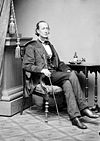 Alfred O. P. Nicholson Alfred O. P. NicholsonAlfred O. P. Nicholson Alfred Osborn Pope Nicholson , a Tennessee Democratic politician and lawyer, was twice a United States Senator from that state.-Biography:... |
Democratic Democratic Party (United States) The Democratic Party is one of two major contemporary political parties in the United States, along with the Republican Party. The party's socially liberal and progressive platform is largely considered center-left in the U.S. political spectrum. The party has the lengthiest record of continuous... |
December 25, 1840 – February 7, 1842 |
26 26th United States Congress -House of Representatives:- Leadership :- Senate :*President: Richard M. Johnson *President pro tempore: William R. King - House of Representatives :*Speaker: Robert M.T. Hunter -Members:This list is arranged by chamber, then by state... (Continued) |
Elected to finish Grundy's term |
|
| 27 27th United States Congress The Twenty-seventh United States Congress was a meeting of the legislative branch of the United States federal government, consisting of the United States Senate and the United States House of Representatives. It met in Washington, D.C. from March 4, 1841 to March 3, 1843, during the one-month... |
||||||
| Vacant | February 7, 1842 – October 17, 1843 |
|||||
| 28 28th United States Congress -House of Representatives:Following the 1840 United States Census, Congress reapportioned the House to include 223 seats . During this congress, one House seat was added for the new state of Florida .- Senate :*President: Vacant... |
||||||
| 11 |  Ephraim H. Foster Ephraim H. FosterEphraim H. Foster Ephraim Hubbard Foster twice served as a United States Senator from Tennessee. During his political career, he was a member of the Whig Party.-Biography:... |
Whig Whig Party (United States) The Whig Party was a political party of the United States during the era of Jacksonian democracy. Considered integral to the Second Party System and operating from the early 1830s to the mid-1850s, the party was formed in opposition to the policies of President Andrew Jackson and his Democratic... |
October 17, 1843 – March 3, 1845 |
28 28th United States Congress -House of Representatives:Following the 1840 United States Census, Congress reapportioned the House to include 223 seats . During this congress, one House seat was added for the new state of Florida .- Senate :*President: Vacant... (Continued) |
Elected to finish Nicholson's term |
|
| 12 |  Hopkins L. Turney Hopkins L. TurneyHopkins L. Turney Hopkins Lacy Turney was a Democratic U.S. Representative and United States Senator from Tennessee.-Biography:... |
Democratic Democratic Party (United States) The Democratic Party is one of two major contemporary political parties in the United States, along with the Republican Party. The party's socially liberal and progressive platform is largely considered center-left in the U.S. political spectrum. The party has the lengthiest record of continuous... |
March 4, 1845 – March 3, 1851 |
29 29th United States Congress -House of Representatives:During this congress, two House seats were added for each of the new states of Texas and Iowa.-Leadership:-Senate:* President: George M. Dallas * President pro tempore: Willie P. Mangum... |
10 | Elected in 1844 United States Senate elections, 1844 The United States Senate election of 1844 was an election which, coinciding with James K. Polk's election, had the Democratic Party retake control of the United States Senate, gaining a net total of eleven seats from the Whigs.... |
| 30 30th United States Congress The Thirtieth United States Congress was a meeting of the legislative branch of the United States federal government, consisting of the United States Senate and the United States House of Representatives. It met in Washington, D.C. from March 4, 1847 to March 3, 1849, during the last two years of... |
||||||
| 31 31st United States Congress The Thirty-first United States Congress was a meeting of the legislative branch of the United States federal government, consisting of the United States Senate and the United States House of Representatives. It met in Washington, D.C. from March 4, 1849 to March 3, 1851, during the last 17 months... |
||||||
| 13 | 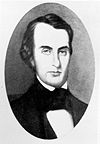 James C. Jones James C. JonesJames C. Jones James Chamberlain Jones was the Governor of Tennessee from 1841 to 1845, and a United States Senator from that state from 1851 to 1857... |
Whig Whig Party (United States) The Whig Party was a political party of the United States during the era of Jacksonian democracy. Considered integral to the Second Party System and operating from the early 1830s to the mid-1850s, the party was formed in opposition to the policies of President Andrew Jackson and his Democratic... |
March 4, 1851 – March 3, 1857 |
32 32nd United States Congress The Thirty-second United States Congress was a meeting of the legislative branch of the United States federal government, consisting of the United States Senate and the United States House of Representatives. It met in Washington, D.C. from March 4, 1851 to March 3, 1853, during the third and... |
11 | Elected in 1850 United States Senate elections, 1850 The United States Senate election of 1850 was an election which had the Democratic Party gain one seat in the United States Senate.As this election was prior to ratification of the seventeenth amendment, Senators were chosen by State legislatures.... |
| 33 33rd United States Congress The Thirty-third United States Congress was a meeting of the legislative branch of the United States federal government, consisting of the United States Senate and the United States House of Representatives. It met in Washington, D.C. from March 4, 1853 to March 3, 1855, during the first two years... |
||||||
| Democratic Democratic Party (United States) The Democratic Party is one of two major contemporary political parties in the United States, along with the Republican Party. The party's socially liberal and progressive platform is largely considered center-left in the U.S. political spectrum. The party has the lengthiest record of continuous... |
34 34th United States Congress The Thirty-fourth United States Congress was a meeting of the legislative branch of the United States federal government, consisting of the United States Senate and the United States House of Representatives. It met in Washington, D.C. from March 4, 1855 to March 4, 1857, during the last two years... |
|||||
| Vacant | March 4, 1857 – October 8, 1857 |
35 35th United States Congress The 35th United States Congress was a meeting of the legislative branch of the United States federal government, consisting of the United States Senate and the United States House of Representatives. It met in Washington, D.C. from March 4, 1857 to March 3, 1859, during the first two years of James... |
12 | |||
| 14 | 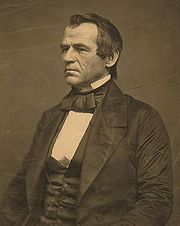 Andrew Johnson Andrew JohnsonAndrew Johnson Andrew Johnson was the 17th President of the United States . As Vice-President of the United States in 1865, he succeeded Abraham Lincoln following the latter's assassination. Johnson then presided over the initial and contentious Reconstruction era of the United States following the American... |
Democratic Democratic Party (United States) The Democratic Party is one of two major contemporary political parties in the United States, along with the Republican Party. The party's socially liberal and progressive platform is largely considered center-left in the U.S. political spectrum. The party has the lengthiest record of continuous... |
October 8, 1857 – March 4, 1862 |
35 35th United States Congress The 35th United States Congress was a meeting of the legislative branch of the United States federal government, consisting of the United States Senate and the United States House of Representatives. It met in Washington, D.C. from March 4, 1857 to March 3, 1859, during the first two years of James... (Continued) |
Elected in 1856 United States Senate elections, 1856 The United States Senate election of 1856 was an election which had the young Republican Party assume its position as one of the United States's two main political parties.... Resigned |
|
| 36 36th United States Congress The Thirty-sixth United States Congress was a meeting of the legislative branch of the United States federal government, consisting of the United States Senate and the United States House of Representatives. It met in Washington, D.C. from March 4, 1859 to March 4, 1861, during the third and fourth... |
||||||
| 37 37th United States Congress The Thirty-seventh United States Congress was a meeting of the legislative branch of the United States federal government, consisting of the United States Senate and the United States House of Representatives. It met in Washington, D.C. from March 4, 1861 to March 4, 1863, during the first two... |
||||||
| Vacant | March 4, 1862 – July 24, 1866 |
37 37th United States Congress The Thirty-seventh United States Congress was a meeting of the legislative branch of the United States federal government, consisting of the United States Senate and the United States House of Representatives. It met in Washington, D.C. from March 4, 1861 to March 4, 1863, during the first two... (Continued) |
U.S. Civil War | |||
| 38 38th United States Congress -House of Representatives:Before this Congress, the 1860 United States Census and resulting reapportionment changed the size of the House to 241 members... |
13 | |||||
| 39 39th United States Congress The Thirty-ninth United States Congress was a meeting of the legislative branch of the United States federal government, consisting of the United States Senate and the United States House of Representatives. It met in Washington, D.C. from March 4, 1865 to March 4, 1867, during the first month of... |
||||||
| 15 | David T. Patterson David T. Patterson David Trotter Patterson was a United States Senator from Tennessee at the beginning of the Reconstruction Period.... |
Unionist | July 24, 1866 – March 3, 1869 |
39 39th United States Congress The Thirty-ninth United States Congress was a meeting of the legislative branch of the United States federal government, consisting of the United States Senate and the United States House of Representatives. It met in Washington, D.C. from March 4, 1865 to March 4, 1867, during the first month of... (Continued) |
Elected to finish vacant term Retired |
|
| Democratic Democratic Party (United States) The Democratic Party is one of two major contemporary political parties in the United States, along with the Republican Party. The party's socially liberal and progressive platform is largely considered center-left in the U.S. political spectrum. The party has the lengthiest record of continuous... |
40 40th United States Congress The Fortieth United States Congress was a meeting of the legislative branch of the United States federal government, consisting of the United States Senate and the United States House of Representatives. It met in Washington, D.C. from March 4, 1867 to March 4, 1869, during the third and fourth... |
|||||
| 16 | William G. Brownlow | Republican Republican Party (United States) The Republican Party is one of the two major contemporary political parties in the United States, along with the Democratic Party. Founded by anti-slavery expansion activists in 1854, it is often called the GOP . The party's platform generally reflects American conservatism in the U.S... |
March 4, 1869 – March 3, 1875 |
41 41st United States Congress -House of Representatives:- Senate :* President : Schuyler Colfax* President pro tempore: Henry B. Anthony - House of Representatives :* Speaker: James G. Blaine -Members:This list is arranged by chamber, then by state... |
14 | Elected in 1869 Retired |
| 42 42nd United States Congress The Forty-second United States Congress was a meeting of the legislative branch of the United States federal government, consisting of the United States Senate and the United States House of Representatives. It met in Washington, D.C. from March 4, 1871 to March 3, 1873, during the third and fourth... |
||||||
| 43 43rd United States Congress The Forty-third United States Congress was a meeting of the legislative branch of the United States federal government, consisting of the United States Senate and the United States House of Representatives. It met in Washington, D.C. from March 4, 1873 to March 4, 1875, during the fifth and sixth... |
||||||
| 17 | 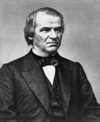 Andrew Johnson Andrew JohnsonAndrew Johnson Andrew Johnson was the 17th President of the United States . As Vice-President of the United States in 1865, he succeeded Abraham Lincoln following the latter's assassination. Johnson then presided over the initial and contentious Reconstruction era of the United States following the American... |
Democratic Democratic Party (United States) The Democratic Party is one of two major contemporary political parties in the United States, along with the Republican Party. The party's socially liberal and progressive platform is largely considered center-left in the U.S. political spectrum. The party has the lengthiest record of continuous... |
March 4, 1875 – July 31, 1875 |
44 44th United States Congress The Forty-fourth United States Congress was a meeting of the legislative branch of the United States federal government, consisting of the United States Senate and the United States House of Representatives. It met in Washington, D.C. from March 4, 1875 to March 4, 1877, during the seventh and... |
15 | Elected in 1875 Died |
| 18 | 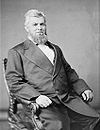 David M. Key David M. KeyDavid M. Key David McKendree Key was a Democratic U.S. Senator from Tennessee from 1875 to 1877 as well as the U.S. Postmaster General under President Hayes.-Biography:... |
Democratic Democratic Party (United States) The Democratic Party is one of two major contemporary political parties in the United States, along with the Republican Party. The party's socially liberal and progressive platform is largely considered center-left in the U.S. political spectrum. The party has the lengthiest record of continuous... |
August 18, 1875 – January 19, 1877 |
Appointed to continue Johnson's term Lost election to finish Johnson's term |
||
| 19 | 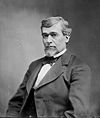 James E. Bailey James E. BaileyJames E. Bailey James Edmund Bailey was a Democratic United States Senator from Tennessee from 1877 to 1881.-Biography:Bailey was born in Montgomery County, Tennessee. He attended the Clarksville Academy and the former University of Nashville. He then studied law and was admitted to the bar in 1843, starting a... |
Democratic Democratic Party (United States) The Democratic Party is one of two major contemporary political parties in the United States, along with the Republican Party. The party's socially liberal and progressive platform is largely considered center-left in the U.S. political spectrum. The party has the lengthiest record of continuous... |
January 19, 1877 – March 3, 1881 |
44 44th United States Congress The Forty-fourth United States Congress was a meeting of the legislative branch of the United States federal government, consisting of the United States Senate and the United States House of Representatives. It met in Washington, D.C. from March 4, 1875 to March 4, 1877, during the seventh and... (Continued) |
Elected to finish Johnson's term Lost re-election |
|
| 45 45th United States Congress -House of Representatives:-Leadership:-Senate:*President: William A. Wheeler *President pro tempore: Thomas W. Ferry -House of Representatives:*Speaker: Samuel J. Randall -Members:This list is arranged by chamber, then by state... |
||||||
| 46 46th United States Congress The Forty-sixth United States Congress was a meeting of the legislative branch of the United States federal government, consisting of the United States Senate and the United States House of Representatives. It met in Washington, D.C. from March 4, 1879 to March 4, 1881, during the last two years of... |
||||||
| 20 | 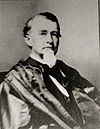 Howell Jackson Howell JacksonHowell Edmunds Jackson Howell Edmunds Jackson was an American jurist and politician. He served on the United States Supreme Court, in the U.S. Senate, United States Court of Appeals for the Sixth Circuit, and the Tennessee House of Representatives. He authored notable opinions on the Interstate Commerce Act and the... |
Democratic Democratic Party (United States) The Democratic Party is one of two major contemporary political parties in the United States, along with the Republican Party. The party's socially liberal and progressive platform is largely considered center-left in the U.S. political spectrum. The party has the lengthiest record of continuous... |
March 4, 1881 – April 14, 1886 |
47 47th United States Congress The Forty-seventh United States Congress was a meeting of the legislative branch of the United States federal government, consisting of the United States Senate and the United States House of Representatives. It met in Washington, D.C. from March 4, 1881 to March 4, 1883, during the administration... |
16 | Elected in 1881 Resigned to become U.S. Circuit Judge |
| 48 48th United States Congress The Forty-eighth United States Congress was a meeting of the legislative branch of the United States federal government, consisting of the United States Senate and the United States House of Representatives. It met in Washington, D.C. from March 4, 1883 to March 4, 1885, during the last two years... |
||||||
| 49 49th United States Congress The Forty-ninth United States Congress was a meeting of the legislative branch of the United States federal government, consisting of the United States Senate and the United States House of Representatives. It met in Washington, D.C. from March 4, 1885 to March 4, 1887, during the first two years... |
||||||
| Vacant | April 14, 1886 – April 16, 1886 |
|||||
| 21 | 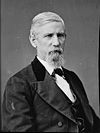 Washington C. Whitthorne Washington C. WhitthorneWashington C. Whitthorne Washington Curran Whitthorne was a Tennessee attorney, Democratic politician, and an Adjutant General in the Confederate Army.-Early life and career:... |
Democratic Democratic Party (United States) The Democratic Party is one of two major contemporary political parties in the United States, along with the Republican Party. The party's socially liberal and progressive platform is largely considered center-left in the U.S. political spectrum. The party has the lengthiest record of continuous... |
April 16, 1886 – March 3, 1887 |
49 49th United States Congress The Forty-ninth United States Congress was a meeting of the legislative branch of the United States federal government, consisting of the United States Senate and the United States House of Representatives. It met in Washington, D.C. from March 4, 1885 to March 4, 1887, during the first two years... (Continued) |
Appointed to continue Jackson's term Elected to finish Jackson's term |
|
| 22 | William B. Bate William B. Bate William Brimage Bate was the governor of Tennessee from 1883 to 1887 and subsequently a United States Senator from Tennessee from 1887 until his death... |
Democratic Democratic Party (United States) The Democratic Party is one of two major contemporary political parties in the United States, along with the Republican Party. The party's socially liberal and progressive platform is largely considered center-left in the U.S. political spectrum. The party has the lengthiest record of continuous... |
March 4, 1887 – March 9, 1905 |
50 50th United States Congress The Fiftieth United States Congress was a meeting of the legislative branch of the United States federal government, consisting of the United States Senate and the United States House of Representatives. It met in Washington, D.C. from March 4, 1887 to March 4, 1889, during the third and fourth... |
17 | Elected in 1887 |
| 51 51st United States Congress The Fifty-first United States Congress, referred to by some critics as the Billion Dollar Congress, was a meeting of the legislative branch of the United States federal government, consisting of the United States Senate and the United States House of Representatives. It met in Washington, D.C... |
||||||
| 52 52nd United States Congress The Fifty-second United States Congress was a meeting of the legislative branch of the United States federal government, consisting of the United States Senate and the United States House of Representatives. It met in Washington, D.C... |
||||||
| 53 53rd United States Congress The Fifty-third United States Congress was a meeting of the legislative branch of the United States federal government, consisting of the United States Senate and the United States House of Representatives. It met in Washington, D.C. from March 4, 1893 to March 4, 1895, during the fifth and sixth... |
18 | Re-elected in 1893 | ||||
| 54 54th United States Congress - House of Representatives :-Leadership:- Senate :* President: Adlai E. Stevenson * President pro tempore: William P. Frye - Majority leadership :* Republican Conference Chairman: John Sherman- Minority leadership :... |
||||||
| 55 55th United States Congress -House of Representatives:* Republican: 206 * Democratic: 124* Populist: 22* Silver Republican: 3* Silver: 1* Independent Republican: 1TOTAL members: 357-Leadership:-Senate:* President: Garret Hobart * President pro tempore: William P... |
||||||
| 56 56th United States Congress -House of Representatives:- Leadership :- Senate :* President: Garret Hobart , until November 21, 1899 , vacant thereafter.* President pro tempore: William P. Frye * Democratic Caucus Chairman: James K. Jones... |
19 | Re-elected in 1899 | ||||
| 57 57th United States Congress -House of Representatives:*Democratic: 151*Republican: 200 *Populist: 5*Silver : 1TOTAL members: 357-Leadership:-Senate:* President: Theodore Roosevelt , until September 14, 1901, vacant thereafter.... |
||||||
| 58 58th United States Congress - House of Representatives :* Republican : 209 * Democratic : 176* Silver Republican : 1TOTAL members: 386-Senate:* President: Vacant* President pro tempore: William P. Frye -Members:... |
||||||
| 59 59th United States Congress The Fifty-ninth United States Congress was a meeting of the legislative branch of the United States federal government, composed of the United States Senate and the United States House of Representatives. It met in Washington, DC from March 4, 1905 to March 4, 1907, during the fifth and sixth... |
20 | Re-elected in 1905 Died |
||||
| Vacant | March 10, 1905 – March 20, 1905 |
|||||
| 23 | 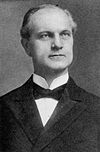 James B. Frazier James B. FrazierJames B. Frazier James Beriah Frazier was Governor of Tennessee from 1903 to 1905 and subsequently a United States Senator from Tennessee from 1905 to 1911.-Biography:... |
Democratic Democratic Party (United States) The Democratic Party is one of two major contemporary political parties in the United States, along with the Republican Party. The party's socially liberal and progressive platform is largely considered center-left in the U.S. political spectrum. The party has the lengthiest record of continuous... |
March 21, 1905 – March 3, 1911 |
59 59th United States Congress The Fifty-ninth United States Congress was a meeting of the legislative branch of the United States federal government, composed of the United States Senate and the United States House of Representatives. It met in Washington, DC from March 4, 1905 to March 4, 1907, during the fifth and sixth... (Continued) |
Elected to finish Bate's term Lost re-election |
|
| 60 60th United States Congress The Sixtieth United States Congress was a meeting of the legislative branch of the United States federal government, composed of the United States Senate and the United States House of Representatives. It met in Washington, DC from March 4, 1907 to March 4, 1909, during the last two years of... |
||||||
| 61 61st United States Congress The Sixty-first United States Congress was a meeting of the legislative branch of the United States federal government, composed of the United States Senate and the United States House of Representatives. It met in Washington, DC from March 4, 1909 to March 4, 1911, during the first two years of... |
||||||
| 24 |  Luke Lea Luke LeaLuke Lea (1879–1945) Luke Lea was a Democratic United States Senator from Tennessee from 1911 to 1917.-Biography:Lea was the great-grandson of an earlier Luke Lea who was a two-term Congressman from Tennessee in the 1830s... |
Democratic Democratic Party (United States) The Democratic Party is one of two major contemporary political parties in the United States, along with the Republican Party. The party's socially liberal and progressive platform is largely considered center-left in the U.S. political spectrum. The party has the lengthiest record of continuous... |
March 4, 1911 – March 3, 1917 |
62 62nd United States Congress - House of Representatives :* Democratic : 230 * Republican : 162* Socialist : 1* Independent : 1TOTAL members: 394-Senate:* President: James S... |
21 | Elected in 1910 Lost renomination |
| 63 63rd United States Congress - House of Representatives:*Democratic : 291 *Republican : 134*Progressive : 9*Independent : 1TOTAL members: 435-Senate:*President of the Senate: Thomas R. Marshall*President pro tempore: James P. Clarke-Senate:... |
||||||
| 64 64th United States Congress The Sixty-fourth United States Congress was a meeting of the legislative branch of the United States federal government, composed of the United States Senate and the United States House of Representatives. It met in Washington, DC from March 4, 1915 to March 4, 1917, during the third and fourth... |
||||||
| 25 | Kenneth McKellar Kenneth McKellar Kenneth Douglas McKellar was an American politician from Tennessee who served as a United States Representative from 1911 until 1917 and as a United States Senator from 1917 until 1953... |
Democratic Democratic Party (United States) The Democratic Party is one of two major contemporary political parties in the United States, along with the Republican Party. The party's socially liberal and progressive platform is largely considered center-left in the U.S. political spectrum. The party has the lengthiest record of continuous... |
March 4, 1917 – January 3, 1953 |
65 65th United States Congress The Sixty-fifth United States Congress was a meeting of the legislative branch of the United States federal government, composed of the United States Senate and the United States House of Representatives. It met in Washington, DC from March 4, 1917 to March 4, 1919, during the fourth and fifth... |
22 | Elected in 1916 |
| 66 66th United States Congress The Sixty-sixth United States Congress was a meeting of the legislative branch of the United States federal government, comprising the United States Senate and the United States House of Representatives. It met in Washington, DC from March 4, 1919 to March 4, 1921, during the last two years of... |
||||||
| 67 67th United States Congress The Sixty-seventh United States Congress was a meeting of the legislative branch of the United States federal government, consisting of the United States Senate and the United States House of Representatives. It met in Washington, D.C. from March 4, 1921 to March 4, 1923, during the first two years... |
||||||
| 68 68th United States Congress The Sixty-eighth United States Congress was a meeting of the legislative branch of the United States federal government, consisting of the United States Senate and the United States House of Representatives. It met in Washington, D.C. from March 4, 1923 to March 4, 1925, during the last months of... |
23 | Re-elected in 1922 | ||||
| 69 69th United States Congress The Sixty-ninth United States Congress was a meeting of the legislative branch of the United States federal government, consisting of the United States Senate and the United States House of Representatives. It met in Washington, D.C. from March 4, 1925 to March 4, 1927, during the third and fourth... |
||||||
| 70 70th United States Congress The Seventieth United States Congress was a meeting of the legislative branch of the United States federal government, consisting of the United States Senate and the United States House of Representatives. It met in Washington, D.C. from March 4, 1927 to March 3, 1929, during the last two years of... |
||||||
| 71 71st United States Congress The Seventy-first United States Congress was a meeting of the legislative branch of the United States federal government, consisting of the United States Senate and the United States House of Representatives. It met in Washington, D.C. from March 4, 1929 to March 4, 1931, during the first two years... |
24 | Re-elected in 1928 | ||||
| 72 72nd United States Congress The Seventy-second United States Congress was a meeting of the legislative branch of the United States federal government, consisting of the United States Senate and the United States House of Representatives. It met in Washington, D.C. from March 4, 1931 to March 4, 1933, during the last two years... |
||||||
| 73 73rd United States Congress The Seventy-third United States Congress was a meeting of the legislative branch of the United States federal government, composed of the United States Senate and the United States House of Representatives. It met in Washington, DC from March 4, 1933 to January 3, 1935, during the first two years... |
||||||
| 74 74th United States Congress -House:Also 2 Delegates, 3 Resident Commissioners-Senate:*President of the Senate: John N. Garner *President pro tempore: Key Pittman -Majority leadership:*Majority leader: Joseph T. Robinson... |
25 | Re-elected in 1934 | ||||
| 75 75th United States Congress The Seventy-fifth United States Congress was a meeting of the legislative branch of the United States federal government, composed of the United States Senate and the United States House of Representatives. It met in Washington, DC from January 3, 1937 to January 3, 1939, during the first two years... |
||||||
| 76 76th United States Congress The Seventy-sixth United States Congress was a meeting of the legislative branch of the United States federal government, composed of the United States Senate and the United States House of Representatives. It met in Washington, DC from January 3, 1939 to January 3, 1941, during the seventh and... |
||||||
| 77 77th United States Congress -Major events:* December 7, 1941: Attack on Pearl Harbor* December 8, 1941: Joint Session of Congress met to hear President Roosevelt deliver his "Day of Infamy" speech... |
26 | Re-elected in 1940 | ||||
| 78 78th United States Congress The Seventy-eighth United States Congress was a meeting of the legislative branch of the United States federal government, composed of the United States Senate and the United States House of Representatives. It met in Washington, DC from January 3, 1943 to January 3, 1945, during the last two years... |
||||||
| 79 79th United States Congress The Seventy-ninth United States Congress was a meeting of the legislative branch of the United States federal government, composed of the United States Senate and the United States House of Representatives. It met in Washington, DC from January 3, 1945 to January 3, 1947, during the last months of... |
||||||
| 80 80th United States Congress The Eightieth United States Congress was a meeting of the legislative branch of the United States federal government, composed of the United States Senate and the United States House of Representatives. It met in Washington, DC from January 3, 1947 to January 3, 1949, during the third and fourth... |
27 | Re-elected in 1946 Lost renomination |
||||
| 81 81st United States Congress The Eighty-first United States Congress was a meeting of the legislative branch of the United States federal government, composed of the United States Senate and the United States House of Representatives... |
||||||
| 82 82nd United States Congress The Eighty-second United States Congress was a meeting of the legislative branch of the United States federal government, composed of the United States Senate and the United States House of Representatives. It met in Washington, DC from January 3, 1951 to January 3, 1953, during the last two years... |
||||||
| 26 |  Albert Gore, Sr. Albert Gore, Sr.Albert Gore, Sr. Albert Arnold "Al" Gore, Sr. was an American politician, serving as a U.S. Representative and a U.S. Senator for the Democratic Party from Tennessee.... |
Democratic Democratic Party (United States) The Democratic Party is one of two major contemporary political parties in the United States, along with the Republican Party. The party's socially liberal and progressive platform is largely considered center-left in the U.S. political spectrum. The party has the lengthiest record of continuous... |
January 3, 1953 – January 3, 1971 |
83 83rd United States Congress The Eighty-third United States Congress was a meeting of the legislative branch of the United States federal government, composed of the United States Senate and the United States House of Representatives. It met in Washington, DC from January 3, 1953 to January 3, 1955, during the first two years... |
28 | Elected in 1952 |
| 84 84th United States Congress The Eighty-fourth United States Congress was a meeting of the legislative branch of the United States federal government, composed of the United States Senate and the United States House of Representatives. It met in Washington, DC from January 3, 1955 to January 3, 1957, during the third and... |
||||||
| 85 85th United States Congress The Eighty-fifth United States Congress was a meeting of the legislative branch of the United States federal government, composed of the United States Senate and the United States House of Representatives. It met in Washington, DC from January 3, 1957 to January 3, 1959, during the fifth and sixth... |
||||||
| 86 86th United States Congress The Eighty-sixth United States Congress was a meeting of the legislative branch of the United States federal government, composed of the United States Senate and the United States House of Representatives. It met in Washington, DC from January 3, 1959 to January 3, 1961, during the last two years... |
29 | Re-elected in 1958 | ||||
| 87 87th United States Congress -House of Representatives :-Senate:* President: Richard Nixon , until January 20, 1961** Lyndon Johnson , from January 20, 1961* President pro tempore: Carl Hayden -House of Representatives:... |
||||||
| 88 88th United States Congress The Eighty-eighth United States Congress was a meeting of the legislative branch of the United States federal government, composed of the United States Senate and the United States House of Representatives. It met in Washington, DC from January 3, 1963 to January 3, 1965, during the last year of... |
||||||
| 89 89th United States Congress -House of Representatives:- Senate :* President of the Senate: Hubert Humphrey , starting January 20, 1965* President pro tempore: Carl Hayden - Majority leadership :* Majority Leader and Democratic Conference Chairman: Mike Mansfield... |
30 | Re-elected in 1964 Lost renomination |
||||
| 90 90th United States Congress The Ninetieth United States Congress was a meeting of the legislative branch of the United States federal government, composed of the United States Senate and the United States House of Representatives. It met in Washington, DC from January 3, 1967 to January 3, 1969, during the last two years of... |
||||||
| 91 91st United States Congress The Ninety-first United States Congress was a meeting of the legislative branch of the United States federal government, composed of the United States Senate and the United States House of Representatives. It met in Washington, DC from January 3, 1969 to January 3, 1971, during the first two years... |
||||||
| 27 |  Bill Brock Bill BrockBill Brock William Emerson "Bill" Brock III is a former Republican United States senator from Tennessee, having served from 1971 to 1977. He is the grandson of William Emerson Brock I, who was a Democratic U.S. senator from Tennessee from 1929 to 1931.-Early life and career:Brock was a native of Chattanooga,... |
Republican Republican Party (United States) The Republican Party is one of the two major contemporary political parties in the United States, along with the Democratic Party. Founded by anti-slavery expansion activists in 1854, it is often called the GOP . The party's platform generally reflects American conservatism in the U.S... |
January 3, 1971 – January 3, 1977 |
92 92nd United States Congress The Ninety-second United States Congress was a meeting of the legislative branch of the United States federal government, composed of the United States Senate and the United States House of Representatives... |
31 | Elected in 1970 Lost re-election |
| 93 93rd United States Congress The Ninety-third United States Congress was a meeting of the legislative branch of the United States federal government, composed of the United States Senate and the United States House of Representatives. It met in Washington, DC from January 3, 1973 to January 3, 1975, during the end of Richard... |
||||||
| 94 94th United States Congress The Ninety-fourth United States Congress was a meeting of the legislative branch of the United States federal government, composed of the United States Senate and the United States House of Representatives. It met in Washington, DC from January 3, 1975 to January 3, 1977, during the administration... |
||||||
| 28 | 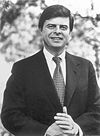 Jim Sasser Jim SasserJim Sasser James Ralph "Jim" Sasser is an American politician and attorney. A Democrat, Sasser served three terms as a United States Senator from Tennessee and was Chairman of the Senate Budget Committee... |
Democratic Democratic Party (United States) The Democratic Party is one of two major contemporary political parties in the United States, along with the Republican Party. The party's socially liberal and progressive platform is largely considered center-left in the U.S. political spectrum. The party has the lengthiest record of continuous... |
January 3, 1977 – January 3, 1995 |
95 95th United States Congress The Ninety-fifth United States Congress was a meeting of the legislative branch of the United States federal government, composed of the United States Senate and the United States House of Representatives. It met in Washington, DC from January 3, 1977 to January 3, 1979, during the first two years... |
32 | Elected in 1976 |
| 96 96th United States Congress The Ninety-sixth United States Congress was a meeting of the legislative branch of the United States federal government, composed of the United States Senate and the United States House of Representatives. It met in Washington, DC from January 3, 1979 to January 3, 1981, during the last two years... |
||||||
| 97 97th United States Congress The Ninety-seventh United States Congress was a meeting of the legislative branch of the United States federal government, composed of the United States Senate and the United States House of Representatives. It met in Washington, DC from January 3, 1981 to January 3, 1983, during the final weeks of... |
||||||
| 98 98th United States Congress The Ninety-eighth United States Congress was a meeting of the legislative branch of the United States federal government, composed of the United States Senate and the United States House of Representatives. It met in Washington, DC from January 3, 1983 to January 3, 1985, during the third and... |
33 | Re-elected in 1982 | ||||
| 99 99th United States Congress The Ninety-ninth United States Congress was a meeting of the legislative branch of the United States federal government, composed of the United States Senate and the United States House of Representatives. It met in Washington, DC from January 3, 1985 to January 3, 1987, during the fifth and sixth... |
||||||
| 100 100th United States Congress -House of Representatives:- Senate :* President: George H.W. Bush * President pro tempore: John Stennis - Majority leadership :* Majority Leader, Democratic Conference Chairman, and Democratic Policy Committee Chairman: Robert Byrd... |
||||||
| 101 101st United States Congress The One Hundred First United States Congress was a meeting of the legislative branch of the United States federal government, composed of the United States Senate and the United States House of Representatives. It met in Washington, DC from January 3, 1989 to January 3, 1991, during the first two... |
34 | Re-elected in 1988 Lost re-election |
||||
| 102 102nd United States Congress -House of Representatives:- Senate :* President:Dan Quayle * President pro tempore: Robert Byrd - Majority leadership :* Majority Leader: George Mitchell* Majority Whip: Wendell Ford- Minority leadership :... |
||||||
| 103 103rd United States Congress - House of Representatives :- Leadership :- Senate :* President: Dan Quayle , until January 20, 1993** Al Gore , from January 20, 1993* President pro tempore: Robert Byrd - Majority leadership :* Majority Leader: George Mitchell... |
||||||
| 29 | 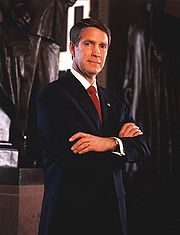 Bill Frist Bill FristBill Frist William Harrison "Bill" Frist, Sr. is an American physician, businessman, and politician. He began his career as an heir and major stockholder to the for-profit hospital chain of Hospital Corporation of America. Frist later served two terms as a Republican United States Senator representing... |
Republican Republican Party (United States) The Republican Party is one of the two major contemporary political parties in the United States, along with the Democratic Party. Founded by anti-slavery expansion activists in 1854, it is often called the GOP . The party's platform generally reflects American conservatism in the U.S... |
January 4, 1995 – January 3, 2007 |
104 104th United States Congress The One Hundred Fourth United States Congress was a meeting of the legislative branch of the United States federal government, composed of the United States Senate and the United States House of Representatives. It met in Washington, DC from January 3, 1995 to January 3, 1997, during the third and... |
35 | Elected in 1994 United States Senate election in Tennessee, 1994 The 1994 United States Senate election in Tennessee was held on November 8, 1994. Incumbent Democratic U.S. Senator Jim Sasser ran for re-election to a fourth term, but was defeated by Repulican nominee Bill Frist.-Campaign:... |
| 105 105th United States Congress The One Hundred Fifth United States Congress was a meeting of the legislative branch of the United States federal government, composed of the United States Senate and the United States House of Representatives. It met in Washington, DC from January 3, 1997 to January 3, 1999, during the fifth and... |
||||||
| 106 106th United States Congress The One Hundred Sixth United States Congress was a meeting of the legislative branch of the United States federal government, composed of the United States Senate and the United States House of Representatives. It met in Washington, DC from January 3, 1999 to January 3, 2001, during the last two... |
||||||
| 107 107th United States Congress The One Hundred Seventh United States Congress was a meeting of the legislative branch of the United States federal government, composed of the United States Senate and the United States House of Representatives. It met in Washington, D.C. from January 3, 2001 to January 3, 2003, during the final... |
36 | Re-elected in 2000 United States Senate election in Tennessee, 2000 The 2000 United States Senate election in Tennessee took place on November 7, 2000. Incumbent Republican U.S. Senator Bill Frist won re-election to a second term.-Results:-External links:... Retired |
||||
| 108 108th United States Congress The One Hundred Eighth United States Congress was the legislative branch of the United States federal government, composed of the United States Senate and the United States House of Representatives from January 3, 2003 to January 3, 2005, during the third and fourth years of George W. Bush's... |
||||||
| 109 109th United States Congress The One Hundred Ninth United States Congress was the legislative branch of the United States, composed of the United States Senate and the United States House of Representatives, from January 3, 2005 to January 3, 2007, during the fifth and sixth years of George W. Bush's presidency. House members... |
||||||
| 30 |  Bob Corker Bob CorkerBob Corker Robert Phillips "Bob" Corker, Jr. is the junior United States Senator from Tennessee. Before his election to the Senate in 2006, he served as mayor of Chattanooga, Tennessee from 2001 to 2005. Corker was a businessman prior to holding public office.-Early life and family:Born in Orangeburg, South... |
Republican Republican Party (United States) The Republican Party is one of the two major contemporary political parties in the United States, along with the Democratic Party. Founded by anti-slavery expansion activists in 1854, it is often called the GOP . The party's platform generally reflects American conservatism in the U.S... |
January 3, 2007 – Present |
110 110th United States Congress The One Hundred Tenth United States Congress was the meeting of the legislative branch of the United States federal government, between January 3, 2007, and January 3, 2009, during the last two years of the second term of President George W. Bush. It was composed of the Senate and the House of... |
37 | Elected in 2006 |
| 111 111th United States Congress The One Hundred Eleventh United States Congress was the meeting of the legislative branch of the United States federal government from January 3, 2009 until January 3, 2011. It began during the last two weeks of the George W. Bush administration, with the remainder spanning the first two years of... |
||||||
| 112 112th United States Congress The One Hundred Twelfth United States Congress is the current meeting of the legislative branch of the United States federal government, composed of the United States Senate and the United States House of Representatives. It convened in Washington, D.C. on January 3, 2011, and will end on January... |
||||||
| # | Senator | Party | Years | Congress | Term | Electoral history |
Class 2
Class 2 SenatorsClasses of United States Senators
The three classes of United States Senators are currently made up of 33 or 34 Senate seats. The purpose of the classes is to determine which Senate seats will be up for election in a given year. The three groups are staggered so that one of them is up for election every two years.A senator's...
belong to the electoral cycle that were elected for two sessions of the U.S. Congress in the first election of 1788 and whose seats in recent years are contested in 1996, 2002, 2008, and 2014.
| # | Senator | Party | Years | Congress | Term | Electoral history |
|---|---|---|---|---|---|---|
| 1 | 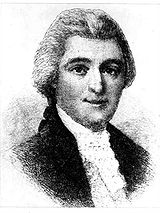 William Blount William BlountWilliam Blount William Blount, was a United States statesman. He was a delegate to the Constitutional Convention for North Carolina, the first and only governor of the Southwest Territory, and Democratic-Republican Senator from Tennessee . He played a major role in establishing the state of Tennessee. He was the... |
Democratic-Republican Democratic-Republican Party (United States) The Democratic-Republican Party or Republican Party was an American political party founded in the early 1790s by Thomas Jefferson and James Madison. Political scientists use the former name, while historians prefer the latter one; contemporaries generally called the party the "Republicans", along... |
August 2, 1796 – July 8, 1797 |
4 4th United States Congress -House of Representatives:- Senate :* President: John Adams * President pro tempore:** Henry Tazewell , first elected December 7, 1795** Samuel Livermore , first elected May 6, 1796** William Bingham , first elected February 16, 1797... |
1 | Elected in 1796 United States Senate elections, 1796 The United States Senate election of 1796 was an election for the United States Senate which, coinciding with John Adams's election as President, had the ruling Federalist Party gain one seat.... Expelled |
| 5 5th United States Congress The Fifth United States Congress was a meeting of the legislative branch of the United States federal government, consisting of the United States Senate and the United States House of Representatives... |
||||||
| 2 |  Joseph Anderson Joseph AndersonJoseph Anderson Joseph Inslee Anderson was an American soldier, judge, and politician, who served as a United States Senator from Tennessee from 1799 to 1815, and later as the first Comptroller of the United States Treasury... |
Democratic-Republican Democratic-Republican Party (United States) The Democratic-Republican Party or Republican Party was an American political party founded in the early 1790s by Thomas Jefferson and James Madison. Political scientists use the former name, while historians prefer the latter one; contemporaries generally called the party the "Republicans", along... |
July 8, 1797 – March 3, 1799 |
Elected to finish Blount's term Resigned when elected to Class 1 seat |
||
| 3 |  William Cocke William CockeWilliam Cocke William Cocke was an American lawyer, pioneer, and statesman. He has the distinction of having served in the state legislature of four different states: Virginia, North Carolina, Tennessee, and Mississippi, and was one of the first two United States senators for Tennessee.-Biography:William was... |
Democratic-Republican Democratic-Republican Party (United States) The Democratic-Republican Party or Republican Party was an American political party founded in the early 1790s by Thomas Jefferson and James Madison. Political scientists use the former name, while historians prefer the latter one; contemporaries generally called the party the "Republicans", along... |
March 4, 1799 – March 3, 1805 |
6 6th United States Congress The Sixth United States Congress was a meeting of the legislative branch of the United States federal government, consisting of the United States Senate and the United States House of Representatives. It met at Congress Hall in Philadelphia, Pennsylvania and in Washington, D.C. from March 4, 1799... |
2 | Elected to finish Anderson's term |
| 7 7th United States Congress - House of Representatives :-Senate:* President: Aaron Burr * President pro tempore:** Abraham Baldwin , first elected December 7, 1801** Stephen R. Bradley , first elected December 14, 1802-House of Representatives:... |
||||||
| 8 8th United States Congress - Senate :* President: Aaron Burr * President pro tempore: John Brown , October 17, 1803 – February 26, 1804** Jesse Franklin , March 10, 1804 – November 4, 1804** Joseph Anderson , January 15, 1805 – December 1, 1805- House of Representatives :... |
||||||
| 4 |  Daniel Smith Daniel SmithDaniel Smith (surveyor) Daniel Smith was a surveyor, an American Revolutionary War patriot, and twice a United States Senator from Tennessee.-Biography:... |
Democratic-Republican Democratic-Republican Party (United States) The Democratic-Republican Party or Republican Party was an American political party founded in the early 1790s by Thomas Jefferson and James Madison. Political scientists use the former name, while historians prefer the latter one; contemporaries generally called the party the "Republicans", along... |
March 4, 1805 – March 31, 1809 |
9 9th United States Congress - Senate :* President: George Clinton * President pro tempore: Samuel Smith - House of Representatives :* Speaker: Nathaniel Macon -Members:This list is arranged by chamber, then by state... |
3 | Elected in 1805 Resigned |
| 10 10th United States Congress - House of Representatives :- Senate :*President: George Clinton *President pro tempore: Samuel Smith , elected April 16, 1808** Stephen R. Bradley , elected December 28, 1808** John Milledge , elected January 30, 1809... |
||||||
| 11 11th United States Congress - House of Representatives :-Leadership:- Senate :* President: George Clinton * President pro tempore:** John Milledge ** Andrew Gregg , elected June 26, 1809** John Gaillard , elected February 28, 1810... |
||||||
| Vacant | April 1, 1809 – April 10, 1809 |
|||||
| 5 |  Jenkin Whiteside Jenkin WhitesideJenkin Whiteside Jenkin Whiteside was an attorney who served as a United States Senator from Tennessee.-Biography:Whiteside was born in Lancaster, Pennsylvania. In Pennsylvania he studied the law and was admitted to the bar there... |
Democratic-Republican Democratic-Republican Party (United States) The Democratic-Republican Party or Republican Party was an American political party founded in the early 1790s by Thomas Jefferson and James Madison. Political scientists use the former name, while historians prefer the latter one; contemporaries generally called the party the "Republicans", along... |
April 11, 1809 – October 8, 1811 |
11 11th United States Congress - House of Representatives :-Leadership:- Senate :* President: George Clinton * President pro tempore:** John Milledge ** Andrew Gregg , elected June 26, 1809** John Gaillard , elected February 28, 1810... (Continued) |
Elected to finish Smith's term | |
| 12 12th United States Congress - House of Representatives :During this congress, one new House seat was added for the new state of Louisiana.- Senate :*President: George Clinton *President pro tempore: William H. Crawford -House of Representatives:*Speaker: Henry Clay... |
4 | Re-elected in 1809 Resigned |
||||
| 6 |  George W. Campbell George W. CampbellGeorge W. Campbell George Washington Campbell was an American statesman who served as a U.S. Representative, Senator, Tennessee Supreme Court Justice, U.S... |
Democratic-Republican Democratic-Republican Party (United States) The Democratic-Republican Party or Republican Party was an American political party founded in the early 1790s by Thomas Jefferson and James Madison. Political scientists use the former name, while historians prefer the latter one; contemporaries generally called the party the "Republicans", along... |
October 8, 1811 – February 11, 1814 |
12 12th United States Congress - House of Representatives :During this congress, one new House seat was added for the new state of Louisiana.- Senate :*President: George Clinton *President pro tempore: William H. Crawford -House of Representatives:*Speaker: Henry Clay... (Continued) |
Elected to finish Whiteside's term Resigned |
|
| 13 13th United States Congress - Senate :* President: Elbridge Gerry , until November 23, 1814, thereafter vacant.* President pro tempore: Joseph B. Varnum , December 6, 1813 – February 3, 1814** John Gaillard , elected November 25, 1814- House of Representatives :... |
||||||
| Vacant | February 12, 1814 – March 16, 1814 |
|||||
| 7 |  Jesse Wharton Jesse WhartonJesse Wharton Jesse Wharton was an attorney who briefly represented Tennessee in each house of Congress.-Biography:Wharton was born in Albemarle County, Virginia and studied law and was admitted to the Virginia bar. Moving to Tennessee, he was elected to the United States House of Representatives from that... |
Democratic-Republican Democratic-Republican Party (United States) The Democratic-Republican Party or Republican Party was an American political party founded in the early 1790s by Thomas Jefferson and James Madison. Political scientists use the former name, while historians prefer the latter one; contemporaries generally called the party the "Republicans", along... |
March 17, 1814 – October 10, 1815 |
13 13th United States Congress - Senate :* President: Elbridge Gerry , until November 23, 1814, thereafter vacant.* President pro tempore: Joseph B. Varnum , December 6, 1813 – February 3, 1814** John Gaillard , elected November 25, 1814- House of Representatives :... (Continued) |
Appointed to continue Campbell's term Retired when successor elected |
|
| 14 14th United States Congress - Senate :* President: Vacant* President pro tempore: John Gaillard of South Carolina, first elected December 4, 1815- House of Representatives :* Speaker: Henry Clay of Kentucky-Members:This list is arranged by chamber, then by state... |
||||||
| 8 | 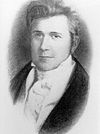 John Williams John WilliamsJohn Williams (Tennessee) John Williams was an American lawyer, soldier, and statesman, operating primarily out of Knoxville, Tennessee, in the first part of the 19th century. He represented Tennessee in the United States Senate from 1815 to 1823, when he lost reelection to Andrew Jackson. Williams also served as colonel... |
Democratic-Republican Democratic-Republican Party (United States) The Democratic-Republican Party or Republican Party was an American political party founded in the early 1790s by Thomas Jefferson and James Madison. Political scientists use the former name, while historians prefer the latter one; contemporaries generally called the party the "Republicans", along... |
October 10, 1815 – March 3, 1823 |
14 14th United States Congress - Senate :* President: Vacant* President pro tempore: John Gaillard of South Carolina, first elected December 4, 1815- House of Representatives :* Speaker: Henry Clay of Kentucky-Members:This list is arranged by chamber, then by state... (Continued) |
Elected to finish Campbell's term | |
| 15 15th United States Congress -Leadership:- Senate :* President: Daniel D. Tompkins * President pro tempore:** John Gaillard , elected March 4, 1817** James Barbour , elected February 15, 1819- House of Representatives :*Speaker: Henry Clay -Members:... |
5 | Appointed to continue his term due to legislature's failure to elect Elected to finish his term Lost re-election |
||||
| 16 16th United States Congress -House of Representatives:During this congress, one House seat was added for the new state of Alabama and one seat was reapportioned from Massachusetts to the new state of Maine. For the beginning of the next congress, six more seats from Massachusetts would be reapportioned to... |
||||||
| 17 17th United States Congress The Seventeenth United States Congress was a meeting of the legislative branch of the United States federal government, consisting of the United States Senate and the United States House of Representatives. It met in Washington, D.C. from March 4, 1821 to March 3, 1823, during the fifth and sixth... |
||||||
| 9 |  Andrew Jackson Andrew JacksonAndrew Jackson Andrew Jackson was the seventh President of the United States . Based in frontier Tennessee, Jackson was a politician and army general who defeated the Creek Indians at the Battle of Horseshoe Bend , and the British at the Battle of New Orleans... |
Democratic-Republican Democratic-Republican Party (United States) The Democratic-Republican Party or Republican Party was an American political party founded in the early 1790s by Thomas Jefferson and James Madison. Political scientists use the former name, while historians prefer the latter one; contemporaries generally called the party the "Republicans", along... |
March 4, 1823 – October 14, 1825 |
18 18th United States Congress The Eighteenth United States Congress was a meeting of the legislative branch of the United States federal government, consisting of the United States Senate and the United States House of Representatives. It met in Washington, D.C. from March 4, 1823 to March 3, 1825, during the seventh and eighth... |
6 | Elected in 1823 Resigned |
| 19 19th United States Congress -House of Representatives:-Leadership:- Senate :* President: John C. Calhoun * President pro tempore: John Gaillard , until December 4, 1825** Nathaniel Macon , from May 20, 1826- House of Representatives :* Speaker: John W. Taylor -Members:... |
||||||
| Vacant | October 15, 1825 – October 27, 1825 |
|||||
| 10 |  Hugh Lawson White Hugh Lawson WhiteHugh Lawson White Hugh Lawson White was a prominent American politician during the first third of the 19th century. He succeeded Andrew Jackson and served in the United States Senate, representing Tennessee, from 1825 until his resignation in 1840, and was a Whig candidate for President in 1836... |
Jacksonian | October 28, 1825 – January 13, 1840 |
19 19th United States Congress -House of Representatives:-Leadership:- Senate :* President: John C. Calhoun * President pro tempore: John Gaillard , until December 4, 1825** Nathaniel Macon , from May 20, 1826- House of Representatives :* Speaker: John W. Taylor -Members:... (Continued) |
Elected to finish Jackson's term | |
| 20 20th United States Congress -House of Representatives:-Leadership:- Senate :* President: John C. Calhoun * President pro tempore: Samuel Smith - House of Representatives :* Speaker: Andrew Stevenson -Members:This list is arranged by chamber, then by state... |
||||||
| 21 21st United States Congress -House of Representatives:-Leadership:- Senate :* President: John C. Calhoun * President pro tempore: Samuel Smith - House of Representatives :* Speaker: Andrew Stevenson -Members:This list is arranged by chamber, then by state... |
7 | Re-elected in 1829 | ||||
| 22 22nd United States Congress -House of Representatives:-Leadership:- Senate :* President:** John C. Calhoun , resigned December 28, 1832, thereafter vacant.* President pro tempore:** Samuel Smith , first elected December 5, 1831** Littleton W... |
||||||
| 23 23rd United States Congress -House of Representatives:For the beginning of this congress, the size of the House was increased from 213 seats to 240 seats, following the 1830 United States Census .- Leadership :- Senate :* President: Martin Van Buren... |
||||||
| Anti-Jacksonian | 24 24th United States Congress -House of Representatives:During this congress one House seat was added for each of the new states of Arkansas and Michigan.-Leadership:- Senate :* President: Martin Van Buren * President pro tempore: William R. King - House of Representatives :... |
8 | Re-elected in 1835 Resigned because he could not conscientiously obey the instructions of his constituents |
|||
| Whig Whig Party (United States) The Whig Party was a political party of the United States during the era of Jacksonian democracy. Considered integral to the Second Party System and operating from the early 1830s to the mid-1850s, the party was formed in opposition to the policies of President Andrew Jackson and his Democratic... |
25 25th United States Congress -House of Representatives:-Leadership:- Senate :* President: Richard Mentor Johnson * President pro tempore: William R. King - House of Representatives :* Speaker: James K. Polk -Members:This list is arranged by chamber, then by state... |
|||||
| 26 26th United States Congress -House of Representatives:- Leadership :- Senate :*President: Richard M. Johnson *President pro tempore: William R. King - House of Representatives :*Speaker: Robert M.T. Hunter -Members:This list is arranged by chamber, then by state... |
||||||
| 11 | 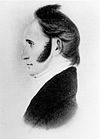 Alexander O. Anderson Alexander O. AndersonAlexander O. Anderson Alexander Outlaw Anderson was an American attorney who represented Tennessee in the United States Senate, and later served in the California State Senate, and on the California Supreme Court.-Biography:The son of longtime U.S... |
Democratic Democratic Party (United States) The Democratic Party is one of two major contemporary political parties in the United States, along with the Republican Party. The party's socially liberal and progressive platform is largely considered center-left in the U.S. political spectrum. The party has the lengthiest record of continuous... |
February 25, 1840 – March 3, 1841 |
26 26th United States Congress -House of Representatives:- Leadership :- Senate :*President: Richard M. Johnson *President pro tempore: William R. King - House of Representatives :*Speaker: Robert M.T. Hunter -Members:This list is arranged by chamber, then by state... (Continued) |
Elected to finish White's term Retired |
|
| Vacant | March 4, 1841 – October 17, 1843 |
27 27th United States Congress The Twenty-seventh United States Congress was a meeting of the legislative branch of the United States federal government, consisting of the United States Senate and the United States House of Representatives. It met in Washington, D.C. from March 4, 1841 to March 3, 1843, during the one-month... |
9 | Legislature failed to elect | ||
| 28 28th United States Congress -House of Representatives:Following the 1840 United States Census, Congress reapportioned the House to include 223 seats . During this congress, one House seat was added for the new state of Florida .- Senate :*President: Vacant... |
||||||
| 12 | 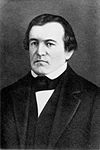 Spencer Jarnagin Spencer JarnaginSpencer Jarnagin Spencer Jarnagin was a United States Senator from Tennessee from 1843 to 1847.- Biography :Jarnagin was born in what was shortly to become Grainger County, Tennessee. He graduated from Greenville College in 1813 and after the study of law was admitted to the bar in 1817. He served in the... |
Whig Whig Party (United States) The Whig Party was a political party of the United States during the era of Jacksonian democracy. Considered integral to the Second Party System and operating from the early 1830s to the mid-1850s, the party was formed in opposition to the policies of President Andrew Jackson and his Democratic... |
October 17, 1843 – March 3, 1847 |
28 28th United States Congress -House of Representatives:Following the 1840 United States Census, Congress reapportioned the House to include 223 seats . During this congress, one House seat was added for the new state of Florida .- Senate :*President: Vacant... (Continued) |
Elected to finish vacant term Lost re-election |
|
| 29 29th United States Congress -House of Representatives:During this congress, two House seats were added for each of the new states of Texas and Iowa.-Leadership:-Senate:* President: George M. Dallas * President pro tempore: Willie P. Mangum... |
||||||
| Vacant | March 4, 1847 – November 21, 1847 |
30 30th United States Congress The Thirtieth United States Congress was a meeting of the legislative branch of the United States federal government, consisting of the United States Senate and the United States House of Representatives. It met in Washington, D.C. from March 4, 1847 to March 3, 1849, during the last two years of... |
10 | |||
| 13 |  John Bell John BellJohn Bell (Tennessee politician) John Bell was a U.S. politician, attorney, and plantation owner. A wealthy slaveholder from Tennessee, Bell served in the United States Congress in both the House of Representatives and Senate. He began his career as a Democrat, he eventually fell out with Andrew Jackson and became a Whig... |
Whig Whig Party (United States) The Whig Party was a political party of the United States during the era of Jacksonian democracy. Considered integral to the Second Party System and operating from the early 1830s to the mid-1850s, the party was formed in opposition to the policies of President Andrew Jackson and his Democratic... |
November 22, 1847 – March 3, 1859 |
30 30th United States Congress The Thirtieth United States Congress was a meeting of the legislative branch of the United States federal government, consisting of the United States Senate and the United States House of Representatives. It met in Washington, D.C. from March 4, 1847 to March 3, 1849, during the last two years of... (Continued) |
Elected late in 1847 | |
| 31 31st United States Congress The Thirty-first United States Congress was a meeting of the legislative branch of the United States federal government, consisting of the United States Senate and the United States House of Representatives. It met in Washington, D.C. from March 4, 1849 to March 3, 1851, during the last 17 months... |
||||||
| 32 32nd United States Congress The Thirty-second United States Congress was a meeting of the legislative branch of the United States federal government, consisting of the United States Senate and the United States House of Representatives. It met in Washington, D.C. from March 4, 1851 to March 3, 1853, during the third and... |
||||||
| 33 33rd United States Congress The Thirty-third United States Congress was a meeting of the legislative branch of the United States federal government, consisting of the United States Senate and the United States House of Representatives. It met in Washington, D.C. from March 4, 1853 to March 3, 1855, during the first two years... |
11 | Re-elected in 1853 |
||||
| 34 34th United States Congress The Thirty-fourth United States Congress was a meeting of the legislative branch of the United States federal government, consisting of the United States Senate and the United States House of Representatives. It met in Washington, D.C. from March 4, 1855 to March 4, 1857, during the last two years... |
||||||
| 35 35th United States Congress The 35th United States Congress was a meeting of the legislative branch of the United States federal government, consisting of the United States Senate and the United States House of Representatives. It met in Washington, D.C. from March 4, 1857 to March 3, 1859, during the first two years of James... |
||||||
| 14 |  Alfred O. P. Nicholson Alfred O. P. NicholsonAlfred O. P. Nicholson Alfred Osborn Pope Nicholson , a Tennessee Democratic politician and lawyer, was twice a United States Senator from that state.-Biography:... |
Democratic Democratic Party (United States) The Democratic Party is one of two major contemporary political parties in the United States, along with the Republican Party. The party's socially liberal and progressive platform is largely considered center-left in the U.S. political spectrum. The party has the lengthiest record of continuous... |
March 4, 1859 – March 3, 1861 |
36 36th United States Congress The Thirty-sixth United States Congress was a meeting of the legislative branch of the United States federal government, consisting of the United States Senate and the United States House of Representatives. It met in Washington, D.C. from March 4, 1859 to March 4, 1861, during the third and fourth... |
12 | Elected in 1859 Withdrew in anticipation of secession |
| Vacant | March 4, 1861 – July 23, 1866 |
37 37th United States Congress The Thirty-seventh United States Congress was a meeting of the legislative branch of the United States federal government, consisting of the United States Senate and the United States House of Representatives. It met in Washington, D.C. from March 4, 1861 to March 4, 1863, during the first two... |
U.S. Civil War | |||
| 38 38th United States Congress -House of Representatives:Before this Congress, the 1860 United States Census and resulting reapportionment changed the size of the House to 241 members... |
||||||
| 39 39th United States Congress The Thirty-ninth United States Congress was a meeting of the legislative branch of the United States federal government, consisting of the United States Senate and the United States House of Representatives. It met in Washington, D.C. from March 4, 1865 to March 4, 1867, during the first month of... |
13 | |||||
| 15 | 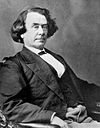 Joseph S. Fowler Joseph S. FowlerJoseph S. Fowler Joseph Smith Fowler was a United States Senator from Tennessee from 1866 to 1871.-Biography:Fowler was born in Steubenville, Ohio. He graduated from Grove Academy in that city and subsequently from Franklin College in New Athens, Ohio in 1843. He taught school in Shelby County, Kentucky in 1844... |
Unionist | July 24, 1866 – March 3, 1871 |
39 39th United States Congress The Thirty-ninth United States Congress was a meeting of the legislative branch of the United States federal government, consisting of the United States Senate and the United States House of Representatives. It met in Washington, D.C. from March 4, 1865 to March 4, 1867, during the first month of... (Continued) |
Elected to finish vacant term Retired |
|
| Republican Republican Party (United States) The Republican Party is one of the two major contemporary political parties in the United States, along with the Democratic Party. Founded by anti-slavery expansion activists in 1854, it is often called the GOP . The party's platform generally reflects American conservatism in the U.S... |
40 40th United States Congress The Fortieth United States Congress was a meeting of the legislative branch of the United States federal government, consisting of the United States Senate and the United States House of Representatives. It met in Washington, D.C. from March 4, 1867 to March 4, 1869, during the third and fourth... |
|||||
| 41 41st United States Congress -House of Representatives:- Senate :* President : Schuyler Colfax* President pro tempore: Henry B. Anthony - House of Representatives :* Speaker: James G. Blaine -Members:This list is arranged by chamber, then by state... |
||||||
| 16 |  Henry Cooper Henry CooperHenry Cooper (U.S. Senator) Henry Cooper was a Tennessee attorney, judge, and politician who served one term in the United States Senate, 1871-1877. He was a Democrat.-Biography:... |
Democratic Democratic Party (United States) The Democratic Party is one of two major contemporary political parties in the United States, along with the Republican Party. The party's socially liberal and progressive platform is largely considered center-left in the U.S. political spectrum. The party has the lengthiest record of continuous... |
March 4, 1871 – March 3, 1877 |
42 42nd United States Congress The Forty-second United States Congress was a meeting of the legislative branch of the United States federal government, consisting of the United States Senate and the United States House of Representatives. It met in Washington, D.C. from March 4, 1871 to March 3, 1873, during the third and fourth... |
14 | Elected in 1870 United States Senate elections, 1870 The United States Senate election of 1870 was an election which had the Republican Party relinquish six seats in the United States Senate, though still retain an overwhelming majority.... Retired |
| 43 43rd United States Congress The Forty-third United States Congress was a meeting of the legislative branch of the United States federal government, consisting of the United States Senate and the United States House of Representatives. It met in Washington, D.C. from March 4, 1873 to March 4, 1875, during the fifth and sixth... |
||||||
| 44 44th United States Congress The Forty-fourth United States Congress was a meeting of the legislative branch of the United States federal government, consisting of the United States Senate and the United States House of Representatives. It met in Washington, D.C. from March 4, 1875 to March 4, 1877, during the seventh and... |
||||||
| 17 | 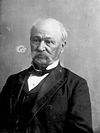 Isham G. Harris Isham G. HarrisIsham G. Harris Isham Green Harris was an American politician. He served as Governor of Tennessee from 1857 to 1862 and as a U.S. Senator from 1877 until his death.... |
Democratic Democratic Party (United States) The Democratic Party is one of two major contemporary political parties in the United States, along with the Republican Party. The party's socially liberal and progressive platform is largely considered center-left in the U.S. political spectrum. The party has the lengthiest record of continuous... |
March 4, 1877 – July 8, 1897 |
45 45th United States Congress -House of Representatives:-Leadership:-Senate:*President: William A. Wheeler *President pro tempore: Thomas W. Ferry -House of Representatives:*Speaker: Samuel J. Randall -Members:This list is arranged by chamber, then by state... |
15 | Elected in 1876 United States Senate elections, 1876 The United States Senate election of 1876 was an election which had the Democratic Party gain three seats in the United States Senate, and which coincided with Rutherford B... |
| 46 46th United States Congress The Forty-sixth United States Congress was a meeting of the legislative branch of the United States federal government, consisting of the United States Senate and the United States House of Representatives. It met in Washington, D.C. from March 4, 1879 to March 4, 1881, during the last two years of... |
||||||
| 47 47th United States Congress The Forty-seventh United States Congress was a meeting of the legislative branch of the United States federal government, consisting of the United States Senate and the United States House of Representatives. It met in Washington, D.C. from March 4, 1881 to March 4, 1883, during the administration... |
||||||
| 48 48th United States Congress The Forty-eighth United States Congress was a meeting of the legislative branch of the United States federal government, consisting of the United States Senate and the United States House of Representatives. It met in Washington, D.C. from March 4, 1883 to March 4, 1885, during the last two years... |
16 | Re-elected in 1884 United States Senate elections, 1884 The United States Senate election of 1884 was an election which had the Republican Party gain four seats in the United States Senate, and which coincided with the presidential election of 1884.... |
||||
| 49 49th United States Congress The Forty-ninth United States Congress was a meeting of the legislative branch of the United States federal government, consisting of the United States Senate and the United States House of Representatives. It met in Washington, D.C. from March 4, 1885 to March 4, 1887, during the first two years... |
||||||
| 50 50th United States Congress The Fiftieth United States Congress was a meeting of the legislative branch of the United States federal government, consisting of the United States Senate and the United States House of Representatives. It met in Washington, D.C. from March 4, 1887 to March 4, 1889, during the third and fourth... |
||||||
| 51 51st United States Congress The Fifty-first United States Congress, referred to by some critics as the Billion Dollar Congress, was a meeting of the legislative branch of the United States federal government, consisting of the United States Senate and the United States House of Representatives. It met in Washington, D.C... |
17 | Re-elected in 1890 United States Senate elections, 1890 The United States Senate election of 1890 was an election which had the Republican Party lose two seats in the United States Senate, though still retain a commanding majority.... |
||||
| 52 52nd United States Congress The Fifty-second United States Congress was a meeting of the legislative branch of the United States federal government, consisting of the United States Senate and the United States House of Representatives. It met in Washington, D.C... |
||||||
| 53 53rd United States Congress The Fifty-third United States Congress was a meeting of the legislative branch of the United States federal government, consisting of the United States Senate and the United States House of Representatives. It met in Washington, D.C. from March 4, 1893 to March 4, 1895, during the fifth and sixth... |
||||||
| 54 54th United States Congress - House of Representatives :-Leadership:- Senate :* President: Adlai E. Stevenson * President pro tempore: William P. Frye - Majority leadership :* Republican Conference Chairman: John Sherman- Minority leadership :... |
18 | Re-elected in 1896 United States Senate elections, 1896 The United States Senate election of 1896 was an election which had the Democratic Party lose six seats in the United States Senate, mostly to minor third parties.... Died |
||||
| 55 55th United States Congress -House of Representatives:* Republican: 206 * Democratic: 124* Populist: 22* Silver Republican: 3* Silver: 1* Independent Republican: 1TOTAL members: 357-Leadership:-Senate:* President: Garret Hobart * President pro tempore: William P... |
||||||
| Vacant | July 9, 1897 – July 19, 1897 |
55 55th United States Congress -House of Representatives:* Republican: 206 * Democratic: 124* Populist: 22* Silver Republican: 3* Silver: 1* Independent Republican: 1TOTAL members: 357-Leadership:-Senate:* President: Garret Hobart * President pro tempore: William P... (Continued) |
||||
| 18 | 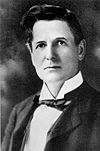 Thomas B. Turley Thomas B. TurleyThomas B. Turley Thomas Battle Turley was a Tennessee attorney who served as a Democratic United States Senator from 1897 to 1901.-Biography:... |
Democratic Democratic Party (United States) The Democratic Party is one of two major contemporary political parties in the United States, along with the Republican Party. The party's socially liberal and progressive platform is largely considered center-left in the U.S. political spectrum. The party has the lengthiest record of continuous... |
July 20, 1897 – March 3, 1901 |
55 55th United States Congress -House of Representatives:* Republican: 206 * Democratic: 124* Populist: 22* Silver Republican: 3* Silver: 1* Independent Republican: 1TOTAL members: 357-Leadership:-Senate:* President: Garret Hobart * President pro tempore: William P... (Continued) |
Appointed to continue Harris's term Elected to finish Harris's term Retired |
|
| 56 56th United States Congress -House of Representatives:- Leadership :- Senate :* President: Garret Hobart , until November 21, 1899 , vacant thereafter.* President pro tempore: William P. Frye * Democratic Caucus Chairman: James K. Jones... |
||||||
| 19 | 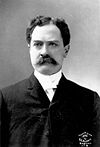 Edward W. Carmack Edward W. CarmackEdward W. Carmack Edward Ward Carmack was an attorney, newspaperman, and political figure who served as a U.S. Senator from Tennessee from 1901 to 1907.... |
Democratic Democratic Party (United States) The Democratic Party is one of two major contemporary political parties in the United States, along with the Republican Party. The party's socially liberal and progressive platform is largely considered center-left in the U.S. political spectrum. The party has the lengthiest record of continuous... |
March 4, 1901 – March 3, 1907 |
57 57th United States Congress -House of Representatives:*Democratic: 151*Republican: 200 *Populist: 5*Silver : 1TOTAL members: 357-Leadership:-Senate:* President: Theodore Roosevelt , until September 14, 1901, vacant thereafter.... |
19 | Elected in 1900 United States Senate elections, 1900 The United States Senate election of 1900 was an election which had the Republican Party gain three seats in the United States Senate, and which corresponded with President William McKinley's landslide re-election.... Lost re-election |
| 58 58th United States Congress - House of Representatives :* Republican : 209 * Democratic : 176* Silver Republican : 1TOTAL members: 386-Senate:* President: Vacant* President pro tempore: William P. Frye -Members:... |
||||||
| 59 59th United States Congress The Fifty-ninth United States Congress was a meeting of the legislative branch of the United States federal government, composed of the United States Senate and the United States House of Representatives. It met in Washington, DC from March 4, 1905 to March 4, 1907, during the fifth and sixth... |
||||||
| 20 | 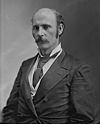 Robert Love Taylor Robert Love TaylorRobert Love Taylor Robert Love Taylor was a U.S. Representative from Tennessee from 1879 to 1881, Governor of Tennessee from 1887 to 1891 and from 1897 to 1899, and subsequently a United States Senator from that state from 1907 until his death. He is notable for winning the governor's office in an election against... |
Democratic Democratic Party (United States) The Democratic Party is one of two major contemporary political parties in the United States, along with the Republican Party. The party's socially liberal and progressive platform is largely considered center-left in the U.S. political spectrum. The party has the lengthiest record of continuous... |
March 4, 1907 – March 31, 1912 |
60 60th United States Congress The Sixtieth United States Congress was a meeting of the legislative branch of the United States federal government, composed of the United States Senate and the United States House of Representatives. It met in Washington, DC from March 4, 1907 to March 4, 1909, during the last two years of... |
20 | Elected in 1906 United States Senate elections, 1906 The United States Senate election of 1906 was an election which had the Republican Party gain three seats in the United States Senate, expanding their majority to almost twice that of the opposing Democratic Party.... Died |
| 61 61st United States Congress The Sixty-first United States Congress was a meeting of the legislative branch of the United States federal government, composed of the United States Senate and the United States House of Representatives. It met in Washington, DC from March 4, 1909 to March 4, 1911, during the first two years of... |
||||||
| 62 62nd United States Congress - House of Representatives :* Democratic : 230 * Republican : 162* Socialist : 1* Independent : 1TOTAL members: 394-Senate:* President: James S... |
||||||
| Vacant | April 1, 1912 – April 10, 1912 |
|||||
| 21 | 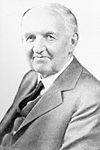 Newell Sanders Newell SandersNewell Sanders Newell Sanders was a Chattanooga businessman who served for a relatively brief time as a United States Senator from Tennessee.-Biography:... |
Republican Republican Party (United States) The Republican Party is one of the two major contemporary political parties in the United States, along with the Democratic Party. Founded by anti-slavery expansion activists in 1854, it is often called the GOP . The party's platform generally reflects American conservatism in the U.S... |
April 11, 1912 – January 24, 1913 |
Appointed to continue Taylor's term Retired when successor elected |
||
| 22 | 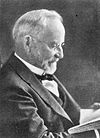 William R. Webb William R. WebbWilliam R. Webb - External links :... |
Democratic Democratic Party (United States) The Democratic Party is one of two major contemporary political parties in the United States, along with the Republican Party. The party's socially liberal and progressive platform is largely considered center-left in the U.S. political spectrum. The party has the lengthiest record of continuous... |
January 24, 1913 – March 3, 1913 |
62 62nd United States Congress - House of Representatives :* Democratic : 230 * Republican : 162* Socialist : 1* Independent : 1TOTAL members: 394-Senate:* President: James S... (Continued) |
Elected to finish Taylor's term Retired |
|
| 23 | 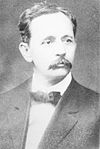 John K. Shields John K. ShieldsJohn K. Shields John Knight Shields was a Democratic United States Senator from Tennessee from 1913 to 1925.-Biography:Shields was born at his family's estate "Clinchdale", near the early pioneer settlement of Bean's Station, Tennessee in Grainger County. His education as a youth was by private tutors, a sign of... |
Democratic Democratic Party (United States) The Democratic Party is one of two major contemporary political parties in the United States, along with the Republican Party. The party's socially liberal and progressive platform is largely considered center-left in the U.S. political spectrum. The party has the lengthiest record of continuous... |
March 4, 1913 – March 3, 1925 |
63 63rd United States Congress - House of Representatives:*Democratic : 291 *Republican : 134*Progressive : 9*Independent : 1TOTAL members: 435-Senate:*President of the Senate: Thomas R. Marshall*President pro tempore: James P. Clarke-Senate:... |
21 | Elected in 1912 |
| 64 64th United States Congress The Sixty-fourth United States Congress was a meeting of the legislative branch of the United States federal government, composed of the United States Senate and the United States House of Representatives. It met in Washington, DC from March 4, 1915 to March 4, 1917, during the third and fourth... |
||||||
| 65 65th United States Congress The Sixty-fifth United States Congress was a meeting of the legislative branch of the United States federal government, composed of the United States Senate and the United States House of Representatives. It met in Washington, DC from March 4, 1917 to March 4, 1919, during the fourth and fifth... |
||||||
| 66 66th United States Congress The Sixty-sixth United States Congress was a meeting of the legislative branch of the United States federal government, comprising the United States Senate and the United States House of Representatives. It met in Washington, DC from March 4, 1919 to March 4, 1921, during the last two years of... |
22 | Re-elected in 1918 Lost renomination |
||||
| 67 67th United States Congress The Sixty-seventh United States Congress was a meeting of the legislative branch of the United States federal government, consisting of the United States Senate and the United States House of Representatives. It met in Washington, D.C. from March 4, 1921 to March 4, 1923, during the first two years... |
||||||
| 68 68th United States Congress The Sixty-eighth United States Congress was a meeting of the legislative branch of the United States federal government, consisting of the United States Senate and the United States House of Representatives. It met in Washington, D.C. from March 4, 1923 to March 4, 1925, during the last months of... |
||||||
| 24 | Lawrence D. Tyson | Democratic Democratic Party (United States) The Democratic Party is one of two major contemporary political parties in the United States, along with the Republican Party. The party's socially liberal and progressive platform is largely considered center-left in the U.S. political spectrum. The party has the lengthiest record of continuous... |
March 4, 1925 – August 24, 1929 |
69 69th United States Congress The Sixty-ninth United States Congress was a meeting of the legislative branch of the United States federal government, consisting of the United States Senate and the United States House of Representatives. It met in Washington, D.C. from March 4, 1925 to March 4, 1927, during the third and fourth... |
23 | Elected in 1924 Died |
| 70 70th United States Congress The Seventieth United States Congress was a meeting of the legislative branch of the United States federal government, consisting of the United States Senate and the United States House of Representatives. It met in Washington, D.C. from March 4, 1927 to March 3, 1929, during the last two years of... |
||||||
| 71 71st United States Congress The Seventy-first United States Congress was a meeting of the legislative branch of the United States federal government, consisting of the United States Senate and the United States House of Representatives. It met in Washington, D.C. from March 4, 1929 to March 4, 1931, during the first two years... |
||||||
| Vacant | August 25, 1929 – September 1, 1929 |
|||||
| 25 | 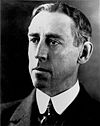 William E. Brock William E. BrockWilliam Emerson Brock William Emerson Brock was a Democratic United States Senator from Tennessee from 1929 to 1931. William Emerson Brock (March 14, 1872 August 5, 1950) was a Democratic United States Senator from Tennessee from 1929 to 1931. William Emerson Brock (March 14, 1872 August 5, 1950) was a Democratic... |
Democratic Democratic Party (United States) The Democratic Party is one of two major contemporary political parties in the United States, along with the Republican Party. The party's socially liberal and progressive platform is largely considered center-left in the U.S. political spectrum. The party has the lengthiest record of continuous... |
September 2, 1929 – March 3, 1931 |
71 71st United States Congress The Seventy-first United States Congress was a meeting of the legislative branch of the United States federal government, consisting of the United States Senate and the United States House of Representatives. It met in Washington, D.C. from March 4, 1929 to March 4, 1931, during the first two years... (Continued) |
Appointed to continue Tyson's term Elected to finish Tyson's term Retired |
|
| 26 |  Cordell Hull Cordell HullCordell Hull Cordell Hull was an American politician from the U.S. state of Tennessee. He is best known as the longest-serving Secretary of State, holding the position for 11 years in the administration of President Franklin Delano Roosevelt during much of World War II... |
Democratic Democratic Party (United States) The Democratic Party is one of two major contemporary political parties in the United States, along with the Republican Party. The party's socially liberal and progressive platform is largely considered center-left in the U.S. political spectrum. The party has the lengthiest record of continuous... |
March 4, 1931 – March 3, 1933 |
72 72nd United States Congress The Seventy-second United States Congress was a meeting of the legislative branch of the United States federal government, consisting of the United States Senate and the United States House of Representatives. It met in Washington, D.C. from March 4, 1931 to March 4, 1933, during the last two years... |
24 | Elected in 1930 Resigned to become U.S. Secretary of State |
| 27 | 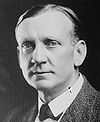 Nathan L. Bachman Nathan L. BachmanNathan L. Bachman Nathan Lynn Bachman was a United States Senator from Tennessee from 1933 until his death. He was a member of the Democratic Party.- Biography :Bachman was born in East Tennessee... |
Democratic Democratic Party (United States) The Democratic Party is one of two major contemporary political parties in the United States, along with the Republican Party. The party's socially liberal and progressive platform is largely considered center-left in the U.S. political spectrum. The party has the lengthiest record of continuous... |
March 4, 1933 – April 23, 1937 |
73 73rd United States Congress The Seventy-third United States Congress was a meeting of the legislative branch of the United States federal government, composed of the United States Senate and the United States House of Representatives. It met in Washington, DC from March 4, 1933 to January 3, 1935, during the first two years... |
Appointed to continue Hull's term Elected to finish Hull's term |
|
| 74 74th United States Congress -House:Also 2 Delegates, 3 Resident Commissioners-Senate:*President of the Senate: John N. Garner *President pro tempore: Key Pittman -Majority leadership:*Majority leader: Joseph T. Robinson... |
||||||
| 75 75th United States Congress The Seventy-fifth United States Congress was a meeting of the legislative branch of the United States federal government, composed of the United States Senate and the United States House of Representatives. It met in Washington, DC from January 3, 1937 to January 3, 1939, during the first two years... |
25 | Re-elected in 1936 Died |
||||
| Vacant | April 24, 1937 – May 5, 1937 |
|||||
| 28 | 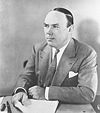 George L. Berry George L. BerryGeorge L. Berry George Leonard Berry was president of the International Pressmen and Assistants' Union of North America from 1907 to 1948 and a Democratic United States Senator from Tennessee from 1937 to 1938.-Early life:... |
Democratic Democratic Party (United States) The Democratic Party is one of two major contemporary political parties in the United States, along with the Republican Party. The party's socially liberal and progressive platform is largely considered center-left in the U.S. political spectrum. The party has the lengthiest record of continuous... |
May 6, 1937 – November 8, 1938 |
Appointed to continue Bachman's term Retired when successor elected |
||
| Vacant | November 9, 1938 – January 16, 1939 |
75 75th United States Congress The Seventy-fifth United States Congress was a meeting of the legislative branch of the United States federal government, composed of the United States Senate and the United States House of Representatives. It met in Washington, DC from January 3, 1937 to January 3, 1939, during the first two years... (Continued) |
Successor elected who preferred to remain as district attorney general | |||
| 76 76th United States Congress The Seventy-sixth United States Congress was a meeting of the legislative branch of the United States federal government, composed of the United States Senate and the United States House of Representatives. It met in Washington, DC from January 3, 1939 to January 3, 1941, during the seventh and... |
||||||
| 29 | 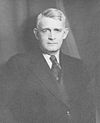 Tom Stewart Tom StewartTom Stewart Arthur Thomas Stewart , more commonly known as Tom Stewart, was a Democratic United States Senator from Tennessee from 1939 to 1949.-Early life and education:... |
Democratic Democratic Party (United States) The Democratic Party is one of two major contemporary political parties in the United States, along with the Republican Party. The party's socially liberal and progressive platform is largely considered center-left in the U.S. political spectrum. The party has the lengthiest record of continuous... |
January 16, 1939 – January 3, 1949 |
76 76th United States Congress The Seventy-sixth United States Congress was a meeting of the legislative branch of the United States federal government, composed of the United States Senate and the United States House of Representatives. It met in Washington, DC from January 3, 1939 to January 3, 1941, during the seventh and... (Continued) |
Elected to finish Bachman's term | |
| 77 77th United States Congress -Major events:* December 7, 1941: Attack on Pearl Harbor* December 8, 1941: Joint Session of Congress met to hear President Roosevelt deliver his "Day of Infamy" speech... |
||||||
| 78 78th United States Congress The Seventy-eighth United States Congress was a meeting of the legislative branch of the United States federal government, composed of the United States Senate and the United States House of Representatives. It met in Washington, DC from January 3, 1943 to January 3, 1945, during the last two years... |
26 | Re-elected in 1942 Lost renomination |
||||
| 79 79th United States Congress The Seventy-ninth United States Congress was a meeting of the legislative branch of the United States federal government, composed of the United States Senate and the United States House of Representatives. It met in Washington, DC from January 3, 1945 to January 3, 1947, during the last months of... |
||||||
| 80 80th United States Congress The Eightieth United States Congress was a meeting of the legislative branch of the United States federal government, composed of the United States Senate and the United States House of Representatives. It met in Washington, DC from January 3, 1947 to January 3, 1949, during the third and fourth... |
||||||
| 30 | .jpg) Estes Kefauver Estes KefauverEstes Kefauver Carey Estes Kefauver July 26, 1903 – August 10, 1963) was an American politician from Tennessee. A member of the Democratic Party, he served in the U.S... |
Democratic Democratic Party (United States) The Democratic Party is one of two major contemporary political parties in the United States, along with the Republican Party. The party's socially liberal and progressive platform is largely considered center-left in the U.S. political spectrum. The party has the lengthiest record of continuous... |
January 3, 1949 – August 10, 1963 |
81 81st United States Congress The Eighty-first United States Congress was a meeting of the legislative branch of the United States federal government, composed of the United States Senate and the United States House of Representatives... |
27 | Elected in 1948 |
| 82 82nd United States Congress The Eighty-second United States Congress was a meeting of the legislative branch of the United States federal government, composed of the United States Senate and the United States House of Representatives. It met in Washington, DC from January 3, 1951 to January 3, 1953, during the last two years... |
||||||
| 83 83rd United States Congress The Eighty-third United States Congress was a meeting of the legislative branch of the United States federal government, composed of the United States Senate and the United States House of Representatives. It met in Washington, DC from January 3, 1953 to January 3, 1955, during the first two years... |
||||||
| 84 84th United States Congress The Eighty-fourth United States Congress was a meeting of the legislative branch of the United States federal government, composed of the United States Senate and the United States House of Representatives. It met in Washington, DC from January 3, 1955 to January 3, 1957, during the third and... |
28 | Re-elected in 1954 | ||||
| 85 85th United States Congress The Eighty-fifth United States Congress was a meeting of the legislative branch of the United States federal government, composed of the United States Senate and the United States House of Representatives. It met in Washington, DC from January 3, 1957 to January 3, 1959, during the fifth and sixth... |
||||||
| 86 86th United States Congress The Eighty-sixth United States Congress was a meeting of the legislative branch of the United States federal government, composed of the United States Senate and the United States House of Representatives. It met in Washington, DC from January 3, 1959 to January 3, 1961, during the last two years... |
||||||
| 87 87th United States Congress -House of Representatives :-Senate:* President: Richard Nixon , until January 20, 1961** Lyndon Johnson , from January 20, 1961* President pro tempore: Carl Hayden -House of Representatives:... |
29 | Re-elected in 1962 Died |
||||
| 88 88th United States Congress The Eighty-eighth United States Congress was a meeting of the legislative branch of the United States federal government, composed of the United States Senate and the United States House of Representatives. It met in Washington, DC from January 3, 1963 to January 3, 1965, during the last year of... |
||||||
| Vacant | August 10, 1963 – August 20, 1963 |
|||||
| 31 |  Herbert S. Walters Herbert S. Walters |
Democratic Democratic Party (United States) The Democratic Party is one of two major contemporary political parties in the United States, along with the Republican Party. The party's socially liberal and progressive platform is largely considered center-left in the U.S. political spectrum. The party has the lengthiest record of continuous... |
August 20, 1963 – November 3, 1964 |
Appointed to continue Kefauver's term Retired |
||
| 32 | 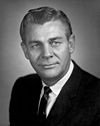 Ross Bass Ross BassRoss Bass Ross Bass was an American florist, postmaster, Congressman, and United States Senator from Tennessee.- Background :... |
Democratic Democratic Party (United States) The Democratic Party is one of two major contemporary political parties in the United States, along with the Republican Party. The party's socially liberal and progressive platform is largely considered center-left in the U.S. political spectrum. The party has the lengthiest record of continuous... |
November 4, 1964 – January 2, 1967 |
88 88th United States Congress The Eighty-eighth United States Congress was a meeting of the legislative branch of the United States federal government, composed of the United States Senate and the United States House of Representatives. It met in Washington, DC from January 3, 1963 to January 3, 1965, during the last year of... (Continued) |
Elected to finish Kefauver's term Lost renomination |
|
| 89 89th United States Congress -House of Representatives:- Senate :* President of the Senate: Hubert Humphrey , starting January 20, 1965* President pro tempore: Carl Hayden - Majority leadership :* Majority Leader and Democratic Conference Chairman: Mike Mansfield... |
||||||
| 33 |  Howard Baker Howard BakerHoward Baker Howard Henry Baker, Jr. is a former Senate Majority Leader, Republican U.S. Senator from Tennessee, White House Chief of Staff, and a former United States Ambassador to Japan.Known in Washington, D.C... |
Republican Republican Party (United States) The Republican Party is one of the two major contemporary political parties in the United States, along with the Democratic Party. Founded by anti-slavery expansion activists in 1854, it is often called the GOP . The party's platform generally reflects American conservatism in the U.S... |
January 3, 1967 – January 3, 1985 |
90 90th United States Congress The Ninetieth United States Congress was a meeting of the legislative branch of the United States federal government, composed of the United States Senate and the United States House of Representatives. It met in Washington, DC from January 3, 1967 to January 3, 1969, during the last two years of... |
30 | Elected in 1966 |
| 91 91st United States Congress The Ninety-first United States Congress was a meeting of the legislative branch of the United States federal government, composed of the United States Senate and the United States House of Representatives. It met in Washington, DC from January 3, 1969 to January 3, 1971, during the first two years... |
||||||
| 92 92nd United States Congress The Ninety-second United States Congress was a meeting of the legislative branch of the United States federal government, composed of the United States Senate and the United States House of Representatives... |
||||||
| 93 93rd United States Congress The Ninety-third United States Congress was a meeting of the legislative branch of the United States federal government, composed of the United States Senate and the United States House of Representatives. It met in Washington, DC from January 3, 1973 to January 3, 1975, during the end of Richard... |
31 | Re-elected in 1972 | ||||
| 94 94th United States Congress The Ninety-fourth United States Congress was a meeting of the legislative branch of the United States federal government, composed of the United States Senate and the United States House of Representatives. It met in Washington, DC from January 3, 1975 to January 3, 1977, during the administration... |
||||||
| 95 95th United States Congress The Ninety-fifth United States Congress was a meeting of the legislative branch of the United States federal government, composed of the United States Senate and the United States House of Representatives. It met in Washington, DC from January 3, 1977 to January 3, 1979, during the first two years... |
||||||
| 96 96th United States Congress The Ninety-sixth United States Congress was a meeting of the legislative branch of the United States federal government, composed of the United States Senate and the United States House of Representatives. It met in Washington, DC from January 3, 1979 to January 3, 1981, during the last two years... |
32 | Re-elected in 1978 United States Senate elections, 1978 The United States Senate election of 1978 in the middle of Democratic President Jimmy Carter's term. The Democrats lost a net of three seats to the Republicans, leaving the balance of the chamber 58-41 in favor of the Democrats.... Retired |
||||
| 97 97th United States Congress The Ninety-seventh United States Congress was a meeting of the legislative branch of the United States federal government, composed of the United States Senate and the United States House of Representatives. It met in Washington, DC from January 3, 1981 to January 3, 1983, during the final weeks of... |
||||||
| 98 98th United States Congress The Ninety-eighth United States Congress was a meeting of the legislative branch of the United States federal government, composed of the United States Senate and the United States House of Representatives. It met in Washington, DC from January 3, 1983 to January 3, 1985, during the third and... |
||||||
| 34 |  Al Gore, Jr. Al Gore, Jr.Al Gore Albert Arnold "Al" Gore, Jr. served as the 45th Vice President of the United States , under President Bill Clinton. He was the Democratic Party's nominee for President in the 2000 U.S. presidential election.... |
Democratic Democratic Party (United States) The Democratic Party is one of two major contemporary political parties in the United States, along with the Republican Party. The party's socially liberal and progressive platform is largely considered center-left in the U.S. political spectrum. The party has the lengthiest record of continuous... |
January 3, 1985 – January 2, 1993 |
99 99th United States Congress The Ninety-ninth United States Congress was a meeting of the legislative branch of the United States federal government, composed of the United States Senate and the United States House of Representatives. It met in Washington, DC from January 3, 1985 to January 3, 1987, during the fifth and sixth... |
33 | Elected in 1984 United States Senate election in Tennessee, 1984 United States Senate election in Tennessee, 1984 took place on November 6, as a part of the Senate class 2 election.-Situation:Three-term popular incumbent Howard Baker, who serves as a United States Senate Majority Leader since 1981 decided to not seek re-election in order to concentrate on... |
| 100 100th United States Congress -House of Representatives:- Senate :* President: George H.W. Bush * President pro tempore: John Stennis - Majority leadership :* Majority Leader, Democratic Conference Chairman, and Democratic Policy Committee Chairman: Robert Byrd... |
||||||
| 101 101st United States Congress The One Hundred First United States Congress was a meeting of the legislative branch of the United States federal government, composed of the United States Senate and the United States House of Representatives. It met in Washington, DC from January 3, 1989 to January 3, 1991, during the first two... |
||||||
| 102 102nd United States Congress -House of Representatives:- Senate :* President:Dan Quayle * President pro tempore: Robert Byrd - Majority leadership :* Majority Leader: George Mitchell* Majority Whip: Wendell Ford- Minority leadership :... |
34 | Re-elected in 1990 Resigned to become U.S. Vice President |
||||
| Vacant | January 2, 1993 – January 5, 1993 |
102 102nd United States Congress -House of Representatives:- Senate :* President:Dan Quayle * President pro tempore: Robert Byrd - Majority leadership :* Majority Leader: George Mitchell* Majority Whip: Wendell Ford- Minority leadership :... (Continued) |
||||
| 103 103rd United States Congress - House of Representatives :- Leadership :- Senate :* President: Dan Quayle , until January 20, 1993** Al Gore , from January 20, 1993* President pro tempore: Robert Byrd - Majority leadership :* Majority Leader: George Mitchell... |
||||||
| 35 | .jpg) Harlan Mathews Harlan MathewsHarlan Mathews Harlan Mathews was a Democratic United States Senator from Tennessee from 1993 to 1994.-Biography:Mathews is a native of Walker County, Alabama. He graduated from Jacksonville State College with a B.A... |
Democratic Democratic Party (United States) The Democratic Party is one of two major contemporary political parties in the United States, along with the Republican Party. The party's socially liberal and progressive platform is largely considered center-left in the U.S. political spectrum. The party has the lengthiest record of continuous... |
January 5, 1993 – December 2, 1994 |
103 103rd United States Congress - House of Representatives :- Leadership :- Senate :* President: Dan Quayle , until January 20, 1993** Al Gore , from January 20, 1993* President pro tempore: Robert Byrd - Majority leadership :* Majority Leader: George Mitchell... (Continued) |
Appointed to continue Gore's term Retired when successor elected |
|
| 36 | 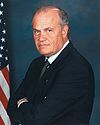 Fred Thompson Fred Thompson |
Republican Republican Party (United States) The Republican Party is one of the two major contemporary political parties in the United States, along with the Democratic Party. Founded by anti-slavery expansion activists in 1854, it is often called the GOP . The party's platform generally reflects American conservatism in the U.S... |
December 2, 1994 – January 3, 2003 |
103 103rd United States Congress - House of Representatives :- Leadership :- Senate :* President: Dan Quayle , until January 20, 1993** Al Gore , from January 20, 1993* President pro tempore: Robert Byrd - Majority leadership :* Majority Leader: George Mitchell... (Continued) |
Elected to finish Gore's term United States Senate special election in Tennessee, 1994 The 1994 United States Senate special election in Tennessee was held on November 8, 1994. Incumbent Democratic U.S. Senator Al Gore decided to resign to become Vice President of the United States and lead to the appointment of Harlan Mathews and the special election. Republican nominee Fred... |
|
| 104 104th United States Congress The One Hundred Fourth United States Congress was a meeting of the legislative branch of the United States federal government, composed of the United States Senate and the United States House of Representatives. It met in Washington, DC from January 3, 1995 to January 3, 1997, during the third and... |
||||||
| 105 105th United States Congress The One Hundred Fifth United States Congress was a meeting of the legislative branch of the United States federal government, composed of the United States Senate and the United States House of Representatives. It met in Washington, DC from January 3, 1997 to January 3, 1999, during the fifth and... |
35 | Re-elected in 1996 United States Senate election in Tennessee, 1996 The 1996 Tennessee United States Senate election was held on November 5, 1996 to select the U.S. Senator from the state of Tennessee. Republican Senator Fred Thompson ran for re-election to a full six year term. Thompson defeated the Democratic challenger, Covington lawyer Houston Gordon in the... Retired |
||||
| 106 106th United States Congress The One Hundred Sixth United States Congress was a meeting of the legislative branch of the United States federal government, composed of the United States Senate and the United States House of Representatives. It met in Washington, DC from January 3, 1999 to January 3, 2001, during the last two... |
||||||
| 107 107th United States Congress The One Hundred Seventh United States Congress was a meeting of the legislative branch of the United States federal government, composed of the United States Senate and the United States House of Representatives. It met in Washington, D.C. from January 3, 2001 to January 3, 2003, during the final... |
||||||
| 37 |  Lamar Alexander Lamar AlexanderLamar Alexander Andrew Lamar Alexander is the senior United States Senator from Tennessee and Conference Chair of the Republican Party. He was previously the 45th Governor of Tennessee from 1979 to 1987, United States Secretary of Education from 1991 to 1993 under President George H. W... |
Republican Republican Party (United States) The Republican Party is one of the two major contemporary political parties in the United States, along with the Democratic Party. Founded by anti-slavery expansion activists in 1854, it is often called the GOP . The party's platform generally reflects American conservatism in the U.S... |
January 3, 2003 – Incumbent |
108 108th United States Congress The One Hundred Eighth United States Congress was the legislative branch of the United States federal government, composed of the United States Senate and the United States House of Representatives from January 3, 2003 to January 3, 2005, during the third and fourth years of George W. Bush's... |
36 | Elected in 2002 United States Senate election in Tennessee, 2002 The 2002 United States Senate election in Tennessee was held on November 5, 2002. Incumbent Republican U.S. Senator Fred Thompson decided to retire. Republican Lamar Alexander won the open seat.-Candidates:*Bob Clement, U.S. Congressman... |
| 109 109th United States Congress The One Hundred Ninth United States Congress was the legislative branch of the United States, composed of the United States Senate and the United States House of Representatives, from January 3, 2005 to January 3, 2007, during the fifth and sixth years of George W. Bush's presidency. House members... |
||||||
| 110 110th United States Congress The One Hundred Tenth United States Congress was the meeting of the legislative branch of the United States federal government, between January 3, 2007, and January 3, 2009, during the last two years of the second term of President George W. Bush. It was composed of the Senate and the House of... |
||||||
| 111 111th United States Congress The One Hundred Eleventh United States Congress was the meeting of the legislative branch of the United States federal government from January 3, 2009 until January 3, 2011. It began during the last two weeks of the George W. Bush administration, with the remainder spanning the first two years of... |
37 | Re-elected in 2008 United States Senate election in Tennessee, 2008 The 2008 United States Senate election in Tennessee was held on November 4, 2008. Incumbent Republican U.S. Senator Lamar Alexander won re-election to a second term.-Candidates:*Bob Tuke, former Chairman of the Democratic Party of Tennessee... |
||||
| 112 112th United States Congress The One Hundred Twelfth United States Congress is the current meeting of the legislative branch of the United States federal government, composed of the United States Senate and the United States House of Representatives. It convened in Washington, D.C. on January 3, 2011, and will end on January... |
||||||
| 113 113th United States Congress The One Hundred Thirteenth United States Congress will be the next meeting of the legislative branch of the United States federal government after the 112th Congress is seated. It will be composed of the United States Senate and the United States House of Representatives. It is scheduled to meet... |
||||||
| # | Senator | Party | Years | Congress | Term | Electoral history |
See also
- United States Congressional Delegations from TennesseeUnited States Congressional Delegations from TennesseeThese are tables of congressional delegations from Tennessee to the United States Senate and United States House of Representatives.Like some states, Tennessee has undergone too much demographic change for some districts to be seen as a continuation of the same numbered district before...
- List of United States Representatives from Tennessee

